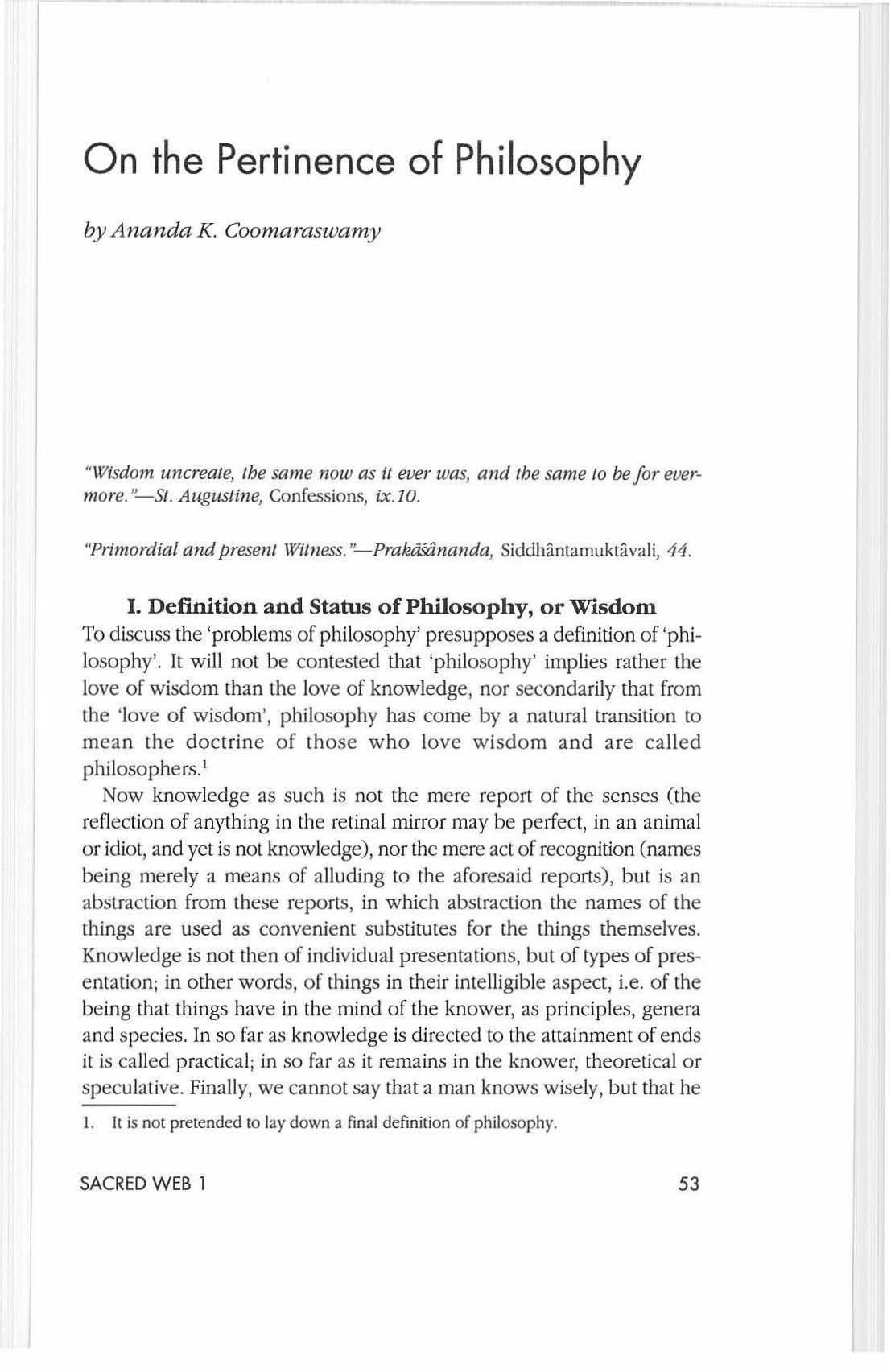
48 minute read
On the Pertinence of Philosophy
from Sacred Web 1
by Ananda K. Coomaraswamy
"Wisdom u'lcreale, the same now as il ever was, and the same 10 be Jar evermore . '!.- SI. Augustine, Confessions, ix.1O.
Advertisement
"Plimordial and preselll lVi/ness ''- PrakiiSlinanda, Siddhantamuktavali, 44.
I. Definition and Status of Philosophy, or Wisdom
To discuss the 'problems of philosophy' presupposes a definition of 'p hilosop hy'. It will not b e contested that 'p hil osop hy ' implies rather the love of wisdom than th e love of knowledge , nor seco ndaril y that from the ' love o f w is dom ', philosophy has come by a natural transition to mean the doctrine of tho se who love wisdom and are called philosophers. '
Now knowledge as suc h is not the mere report of the senses (the re fl ec tion of any thin g in the retinal mirror may be p e rfect, in an animal or idiot , and yet is not knowledge), nor the mere act of recognition (names being merely a means of alluding to the aforesaid repons), but is an abstractio n from these reports , in which abstmction the names of the things are used as conve ni ent substitutes for th e things themselves. Knowledge is not then of individual prese ntati ons, but of types of presen tati o n ; in other words, of things in th eir int e lli g ible aspect, i.e. o f the being tha t things have in the mind of the knower, as principles, genera and s p ecies. In so far as knowledge is direc ted to the attainment of ends it it; ca ll ed practical ; in so far as it remains in the knower, theoretica l or specu lative. Finally , we cannot say that a man knows wisely. but that he know s we ll ; w isdom takes kn owledge ro r granted and gove rn s the moveme nt of th e w ill w ith res p ect to thin gs known ; or we m ay say that w isdom is the c riterio n of va lu e, accord ing to wh ic h a d ec is ion is mad e to act or not to act in any given case or univ e rsa ll y. Whic h will app ly no t merely to external acts , but a lso to co nt e mplati ve or th eoret ical a c ts. Phi losophy, accordi n gly, is a wisdo m abo ut kn owledge , a correc tion dusa vo ir-pense r. In general, "Ph il oso ph y 1I"2 has been held to e mbra ce what we have referred to ab ove as theoretical or s p ec ulati ve kn ow ledge, for e xampl e, log ic, e thic s, psyc h o logy , aesthetic , th eo logy, onto logy ; and in thi s se nse the pro b le ms of ph il osop hy are ev iden tl y tho se of rati o nali salio n , the purpose of phil osop hy being so to co rrelate the data of empirical experience as to ' make se nse' o f th e m , whic h is acco mplis he d for t he most part b y a red u ct io n of pa rt icu lars to univ ersa ls ( d educt ion). And thu s defined , th e fun c t io n of p hiloso ph y co ntra sts wi th t ha t of prac ti cal science, of wh ic h the p ro p er function is that of predicting th e parti c ular from the un ive rsa l (induction). Beyond t hi s, h oweve r, "Philoso phy I" has b ee n he ld to mea n a wisdom not so mu c h about parti c ul ar kind s of th ought, as a wisdom abo ut thinkin g, a nd an a na lysis of w h at it mea ns to think , and an enquiry as to what may b e the nature of t he ultim ate reference of th oug ht. In thi s se n se the probl e ms of p hilosophy are wi th res pect to t he ultimate na ture of real ity , act ua li ty or experience; meaning b y re ality w ha teve r is in act and not mere ly p ote ntial. We may ask, fo r exa mpl e, what are truth, goodness and bea uty (co ns idere d as concepts ab stracted from ex p e ri e nce), or we may ask whether the se or a ny other concepts ab stra cted fro m expe ri e nce ha ve ac tu a ll y any being of th e ir ow n ; which is th e matter in d ebate as b e tw ee n nominali sts on th e one hand and rea li sts, or idealists, on the other. ' It m ay be n o te d that, s ince in a ll the se app li ca ti o ns phi loso ph y means 'w isdom ', if or w h en we s p eak o f phil osop h ies in th e p lural , we s h a ll mean not d iffe rent kind s of wisdom , but w isdom wi th res p ect to di fferent kind s of things. The wisdom may be more or less , but still one and the same order of wisdom.
I . It is not pretended to lay down a final definition of philosophy.
2. Our numbering of the in inverse order as II and I is because Aristotle's firSl Ph ilosophy, viz. Me taphysics, is actua ll y prior in logical order of thought , which proceeds from w ithin outw ards.
3. TIlis is, for example, the matter in de bate as between Bu dd hi st and Brahmanical philoso phers. For the nominalist , the: ultimate forms, ideas , images Of reasons are merely names or the counte rs of thought and valid o nly as means or communicatio n; for the realist (idealist) th e ul timate forms are ' re alities' depe ndent upon and in herent in being, i.e. real in thei r being and nom inal only in the se nse 'o nly logica ll y di stingu ishable '.
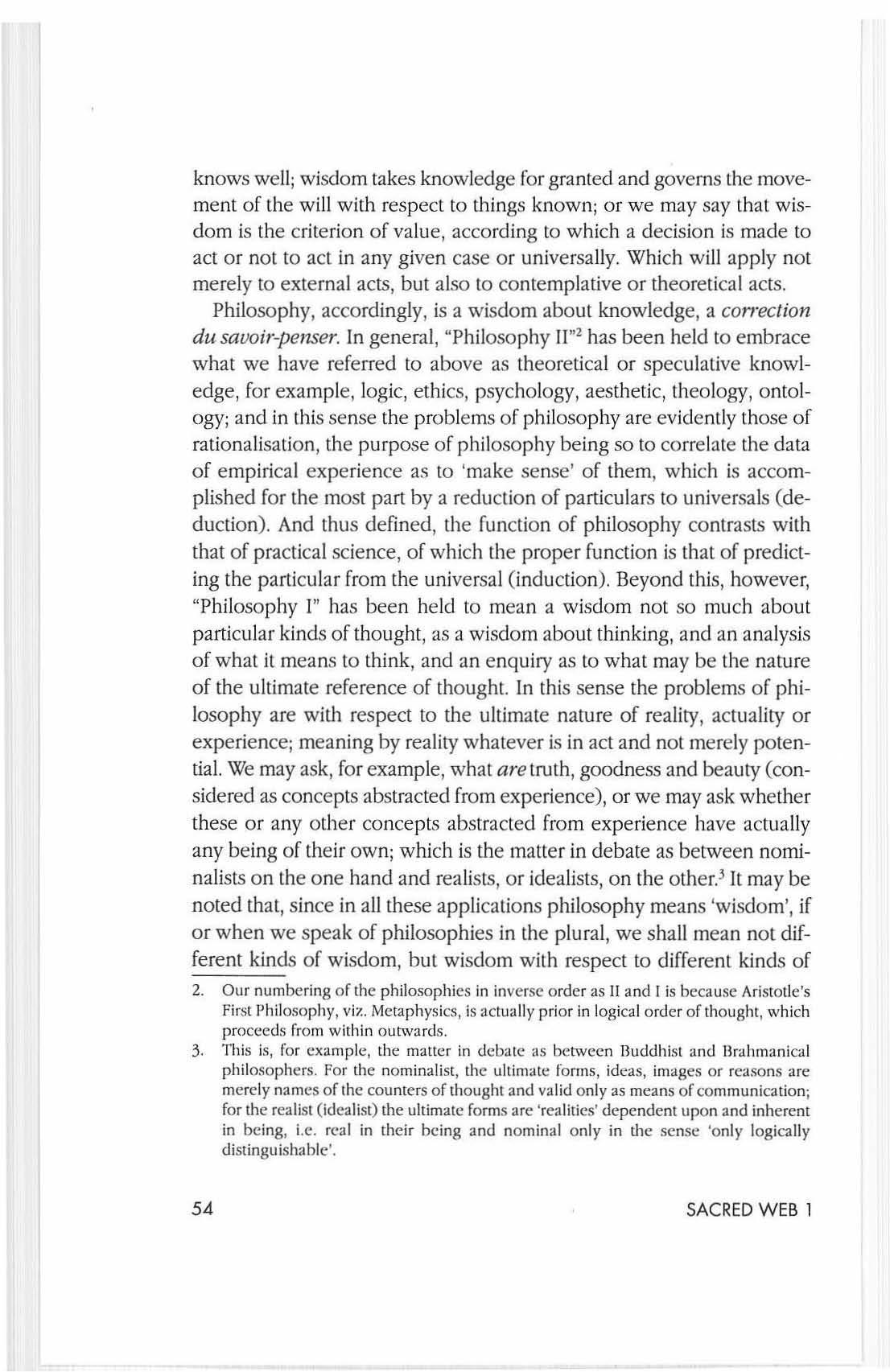
As to this orde r, if knowledge is by abstraction, and wisdom about knowledge , it follows that this wisdom, pertaining to things known or knowable , and attained by a process of reasoning or dialectic from experimental data , and neither being n or claiming to be revea led or gnostic doc trin e, in no way transcends thought , but is rather the best kind of thought , or, let us say, the tru est science. It is, indeed, an excellent wisdom , and assumi ng a good will, one of great value to man. 4 But let us not forget that because of its experi men tal , that is to say statistical basis, a nd even s upp osing a n infallible operation of the reason s uc h as may be granted to mathematics, thi s wisdom ca n never es tabli sh absolute ce rtainties , and ca n predict only with veIY great probability of success; th e ' laws' of science, however useful, do nothing more than resume past exper ience. Furthermore, philosophy in the second of th e above senses, or human wisdom about things known or knowab le, mus t be systema ti c, s ince it is required by hypothesis tha t its pe rfec ti on will consist in an account in g for every th ing, in a perfect fining together of a ll parts of the puzzl e to make one logical whole; and the system must be a closed system, one namely limited to the field of time and space, cause and effect, for it is by hypothesis about knowable and determinate things, all of which are presented to the cognitive faculty in the guise of effects, for which ca uses a re so ught. s For example, space being of indefinite and not infinite ex te nt ,6 the w isdom about determinate things can not have any appli ca tion to whatever "rea lity " th ere mayor may not belong to non -s patial, or immaterial, modes, or Similarly, to a non -temporal mode, for if th ere be a 'now\ we ha ve no se nsibl e expe ri ence of any suc h thing, nor can we conceive it in terms of logic. If it we re attempted by means of the human wisdom to overstep the natural limits of its operation , the most that cou ld b e sai d wou ld be th a t the reference 'indefi nit e magnitude ' (ma th ematica l infinity) presents a certai n analogy to the reference 'essential infinity ' as postulated in relig ion and metaphysics , but nothing could be affirmed o r denied w ith respect to the 'isness' (esse) of this infinite in esse nce.
4. Common sense is an admimblc ching, as is also instinct, but neither of these is the saml.: as reason, nor the same as the wisdom that is not about human affairs, but 's pec ula t ive' , i.l.:. known in the mirror of the pure intellect.
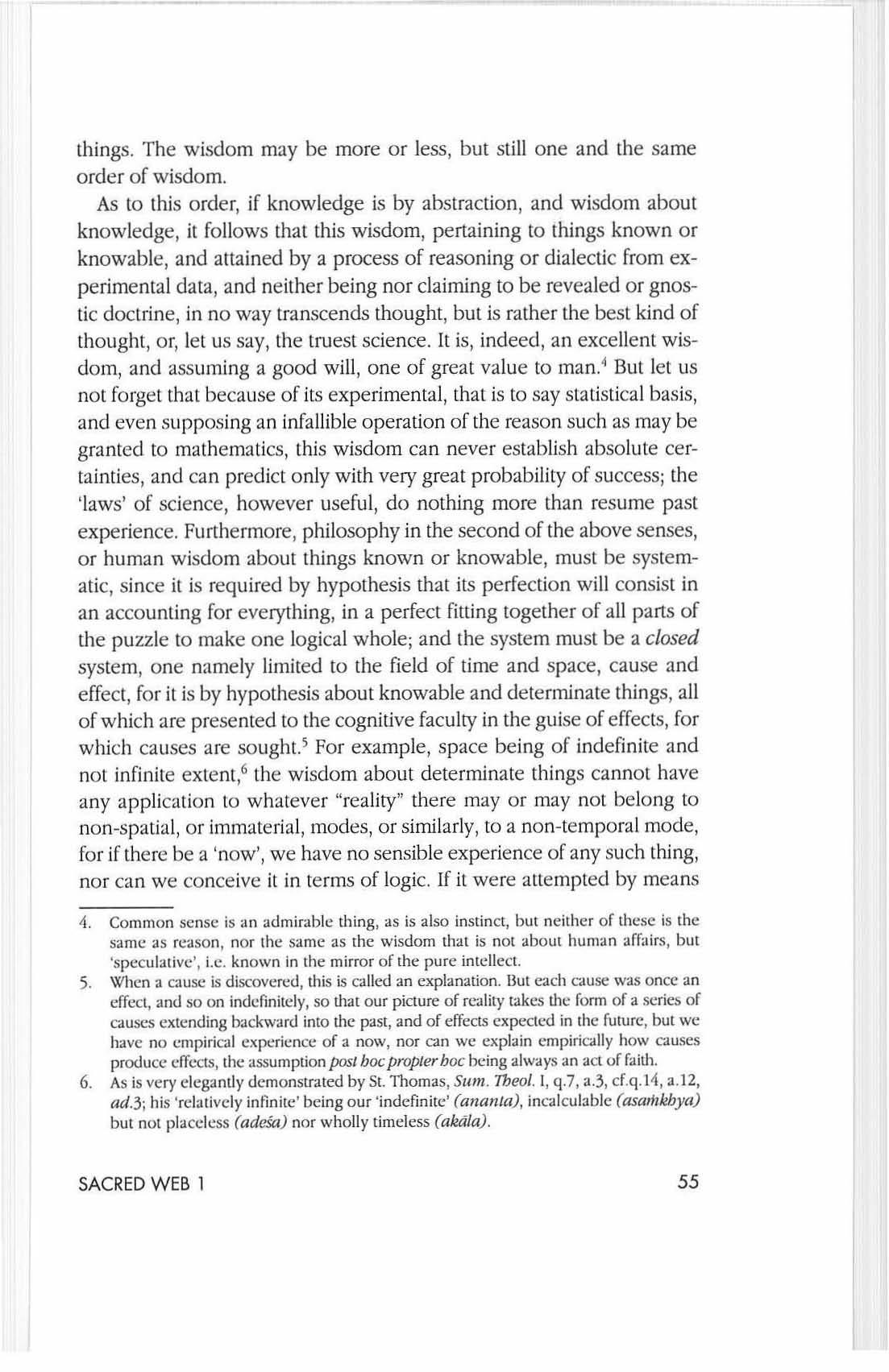
5. When a cause is discovered, thi s is C"Jllcd an explanation. Uut each C"JUSC was once an effec l, and so on indefinitel y, so that o ur pic ture of re-JlilY takes the ronn of a series of C"JUS(.!S extending backward into the past , and o f effects CXp(!clcd in thc future , but we ha ve no empiriC"JI experiencc of a now , nor C"JIl we explain <:mpiricdUy how C"Juses produce effects, the assumption post hoc propter hoc being always an a CI of faith.
6. As is very e legantly dcmonstrJ tcd by S1. Thomas , Sum . 7boo/. I, q .7, a.3, cf.q . 11, a.12, ad.); his ' relatively infinite' being our 'indefinite' (anan/a), in calculable (asaJ/lkbY(I) but not pla ce kss (adaSa) nor wholly timeless (akala).
If the human wisdom, d e pending upon itself alone (,rationalism'), propose s a religion, thi s will be what is called a ' natural re ligion ', having for its d e ity that referent of which the ope ratio n is seen everyw here, and yet is most refractory to ana lysis, viz. 'life' or 'energy ' . And this natural religion will be a pantheism or monis m , post ulatin g a soul (anima, 'animation') of the universe , everywhere known by its effects percept ibl e in the move ments of things; amongst which things any distinction of animate and inanimate will be out of place, inasmuch as animation can be defined rati o nally only as 't hat which is expressed in, or is th e cause of, motion '. Or if not a pantheism, then a polytheism or plurali s m , in which a varie ty of animations ('forces') is postulated as underlying and 'explaining ' a corresponding variety of motions. 7 But nothing can be affirm ed or denied as regards the proposilion that such animation or animations may be merely determinate and contingent aspect o f a ' reality' indeterminate in its elf. Expressed more technically, panth eis m and polytheism are essent ia ll y profane co n ce ptions, and if recogni sa ble in a given religi o us or metaphysical d oc trine , are there interpolations of the reason , not essent ial to the religious or metaphysical doctrine in itself.8
On the ot her hand, the human wisdom, not re lying on itself a lone , may be applied to a partial , viz. analogical, exposition of the re ligious or metaphysi ca l Wisdoms, these being taken as prior to itself. For although the two wisdoms (Philosophy II and Philoso phy I) are different in kind , there ca n be a formal coincidence , and in this sense what is called a
7. Science diffcrs from animism only in this respect, that while science assumes forces in the sense o f blind Wills, animism (which is also a kind of philosophy) personifies these forces and endows them with a free will,
8. Pantheism is more commonly predicatcd of a given doctrine merely by imputation, either with unconsciously dishonest intention o r by customary usage uncritically perpetuated. In every case the observer presumed to be impartial should co nsid e r the doctrine itself, and not what is sa id of it by hostile critics. On the general impropricty of the term pant he ism ' in connection with the Vedanta , see Lacombc , Avant-propos to Rene Grousset , Les Philosophies Illdfelllles , p. x iv, note 1, and Whitby, Preface to Rene Guenon , Mml and his Becomfl/g a ccording 10 the Vediillla , 19-15 , p ix.
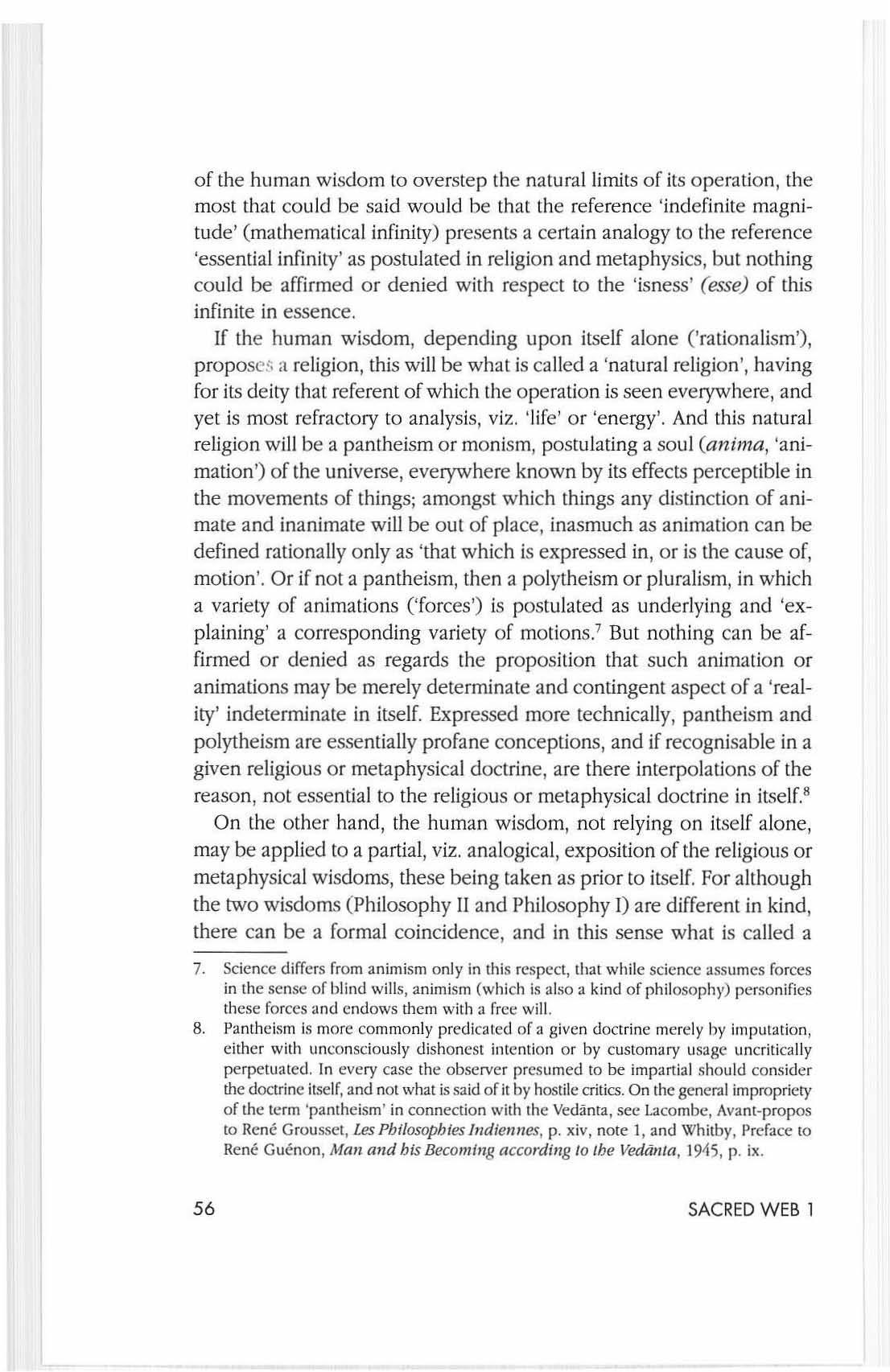
' reconciliation of science and religion '. Each is then dependent on the ot her, ahhough in different ways; the sciences depending on re vea led truth for their formal correction, and revealed truth re lying upon the sciences for its demonstra tion by analogy , ' not as though it stood in need of them , but only to make its leaching clearer'.
In ei th er case, th e final end of human wisdom is a good or happiness that sha ll a cc rue e ith er to the philosopher himself, or to his neighbours, or to humanity at large, but necessarily in terms of material
Th e kind of good env isaged mayor m ay not be a moral good. 9 For example, if we ass ume a good will, i.e. a natura l sense of justice, th e ra l re li g ion will be expressed in elhics in a sanction of such laws of du c t as mos t conduce to the common good, and he may be admired who sac rifi ces even life for the sake of this. In aesthetic (a rt being circa IacUbilia) the natural religion , given a good will, will justify the manufacture of s uch goods as are apt for human well-being, whether as physica l necess iti es or as so urces of sensible pleasure. All this belongs to ' humanis m ' and is very far from despicab le. But in case th ere is not a good will, th e natural religion may equally be employed to ju s tify the proposition ' might is right ' or 'de vil lake the hindmost ', and in manufa ct ure th e production of goods either by methods which are injurious to the co mm o n good, or which in themselves are immediately adapted to e nds injurious to th e co mmon good; as in the cases of c hild -labour and th e manufa c tu re of poison gas. Revealed truth, on the contrary, demands a good wi ll a priori, adding that the aid of the rational philosophy, as science or art, is required in order th at the good wi ll may be made effective. 10
There is then another kind of Philosoph y I, viz. that to whi c h we have alluded as ' revealed truth', which though it covers the whole ground of Philosophy II, does so in another way , while beyond this it treats co nfidently of ' realities ' wh ich may indeed be immanent in time and s pace tissue , and are not wholly incapable of rational demon s tration , but are nevertheless sa id to be tran sce ndent with re spec t to thi s tissue, i.e . by no mean s wholly conta in e d within it nor given b y it, nor wholly amenable to demonstrat io n The "Firs t Philosoph y," for e xample , affinns th e actuality o f a ' n ow' indepe ndent of the flux of time ; while e xperience is on ly of a past and future, Aga in, the pro cedure of the First Ph il osophy is no longer in the first p lace ded uctive and seco nd ari ly ind u ctive , but inductive from firs t to last , its logic procee ding invariably from the t ranscendental to th e universa l, and thence as before to the pa rticu lar. T hi s First Philoso phy , indeed , taking for granted the p rincip le 'as above, so below' and vice-versa,1\ is ab le to find in every microcos mi c fact the trac e o r sy mb o l of a macrocos mic actuality, and according ly resorts to ' prooF by analogy; but this apparently deductive procedure is here emp loyed by way of demonstrat ion, and not by w a y of proof, wh e re log ica l proof is o u t o f the questio n , and it s p lace is taken e ither b y faith (Augustine's cre d o tit inlelliga m) o r by th e evidence of imm e diat e e xperience (a lattkika-pratyakea },12
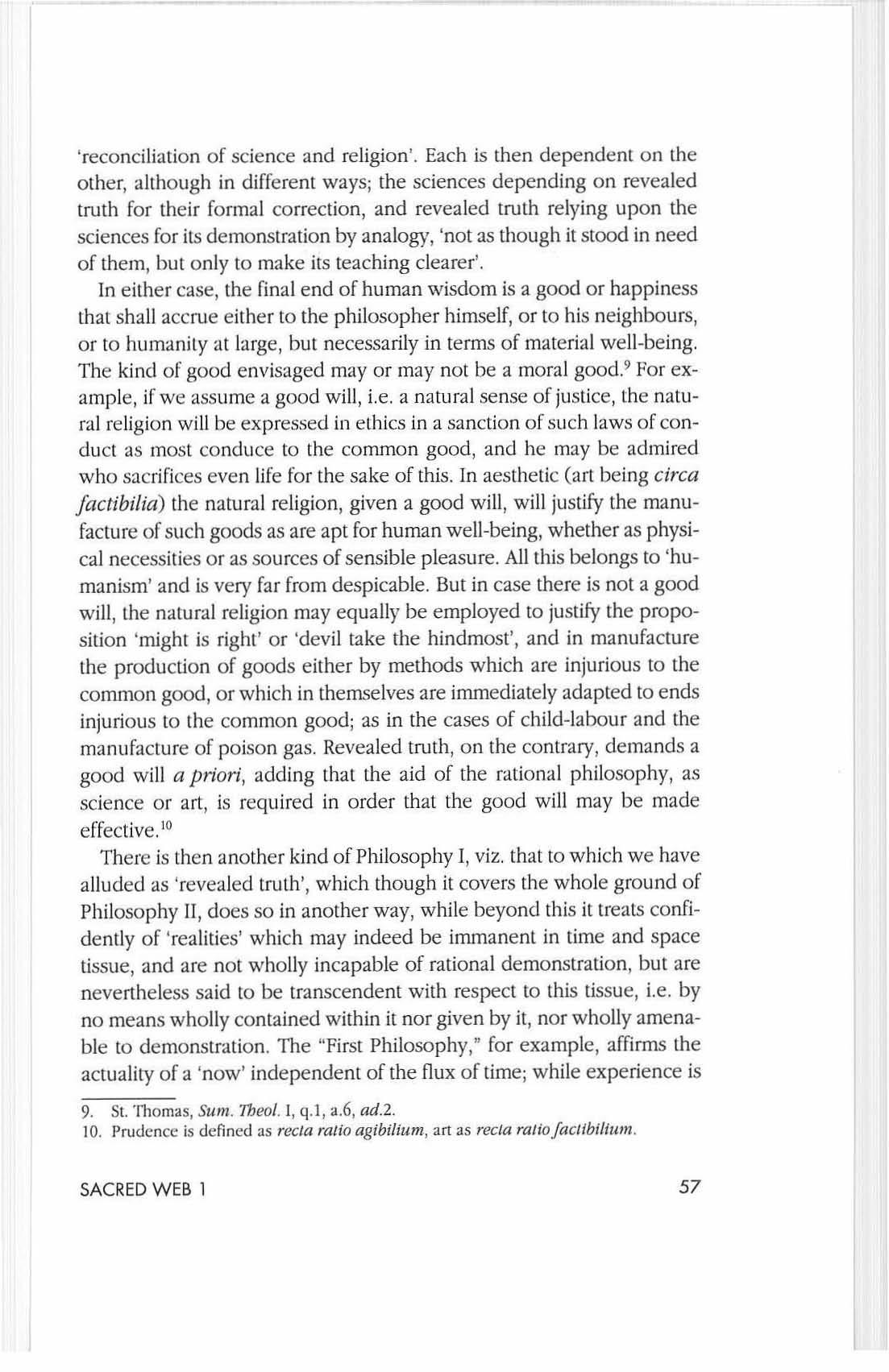
Our fir s t p ro ble m in connection wit h th e highest wisdom, co ns idered as a do c trin e known by revelation (w hether th rough ear or sy mbolic transmission), consistent but un systema tic, and intelligibl e in itself a lthough it treats in part of unintellig ible things, is to distinguis h withou t dividi n g re li gion from metaphy s ics , Philosophy II from Ph iloso p hy l. This is a d is t inc ti o n w ithout a d iffe re nce, li ke t h at of attribute f rom ess ence, and ye t a di s tincti o n of fund a me ntal importan ce if we are to grasp the true meaning of any given s pi ritual ac£.
We proceed therefore first to e mpha s ize the di st in c tion s that can be drawn as be twee n relig ion and me taphysic s with re s p ec t to a wisdom that is o ne in itse lf a nd in any case p rimarily directed Lo immaterial , or ralionally speaking, ' unrea l ' things .'3 Broad ly speaking, th e di s tinclion is th a t of Christianity from Gnost icism , SunnT from Sh i'a do c trine, Ra.manuja from Sankaracatya, of t he wi ll from the intellect , participati o n ( bhakti)
11. E.g Allareya Brdbmallo , vi ii 2.
12 'Me ta ph ysics can d isp ute with one who de ni es its prin ciples, if only the oppone nt will make some co ncession; but if he concede nOlhing , it ca n ha ve no d ispute with h im .... lf ou r oppo nent belie ves nothing o f d iv ine revel ati on, th e re is no longer any means of proving the articles of faith by reasoni ng ' Sl. Thomas , Sum 71)00/. I, q .l , a.8c.) ; and Ibid. q.46 , a.2 : 'T he articles of faith can no t be proved demonstratively'. Similarly in India it is repeatedly and explici tly asserted that tb e truth () rVedic d oct rine cannot be demonstrJted but only e xperi enced. ' By what should one know the Knower of knowing' (Brhaddrall.yaka Up. iv .5. 15) from gnosis (jrldna), or knowledge-of (avidyii) from knowledge-as (v idyii). As regards the Way, th e distinction is one o f co nsecration from initiation l and of passive from active integration; and as regards the End, of assimilation (tadakcirata) from identification (tadbhava). Religion requires of its adherents to be perfected; metaphys ics that they realise their ow n perfection that ha s nev er been infringed (eve n Satan is still virtually Lu cife r, being fallen in grace and not in nature). Sin, from the stand p o int of religion, is moral, from that of metaphysics, intellectual (mortal sin in m e taphysics being convic tion o r assertion of independent self-subsistence, as in Satan's case, or e nvy of the spiritual anainments of others, as in Indra 's).
13. 'lhroughout the present essay it is assumed that sens ibility means the perception of thi ngs by the senses, not a cogn ili on bu t a reaction; reason , the activity o f the intelligen ce w ith respect [0 th e causal series of acci de nts , so me tim es called the c hain o f fate, or in othe r words an intelligen ce wit h respec t to things phenomenally know n in time a nd space and called 'm alerial '; and int e ll ec l, t he habit o f first principles.
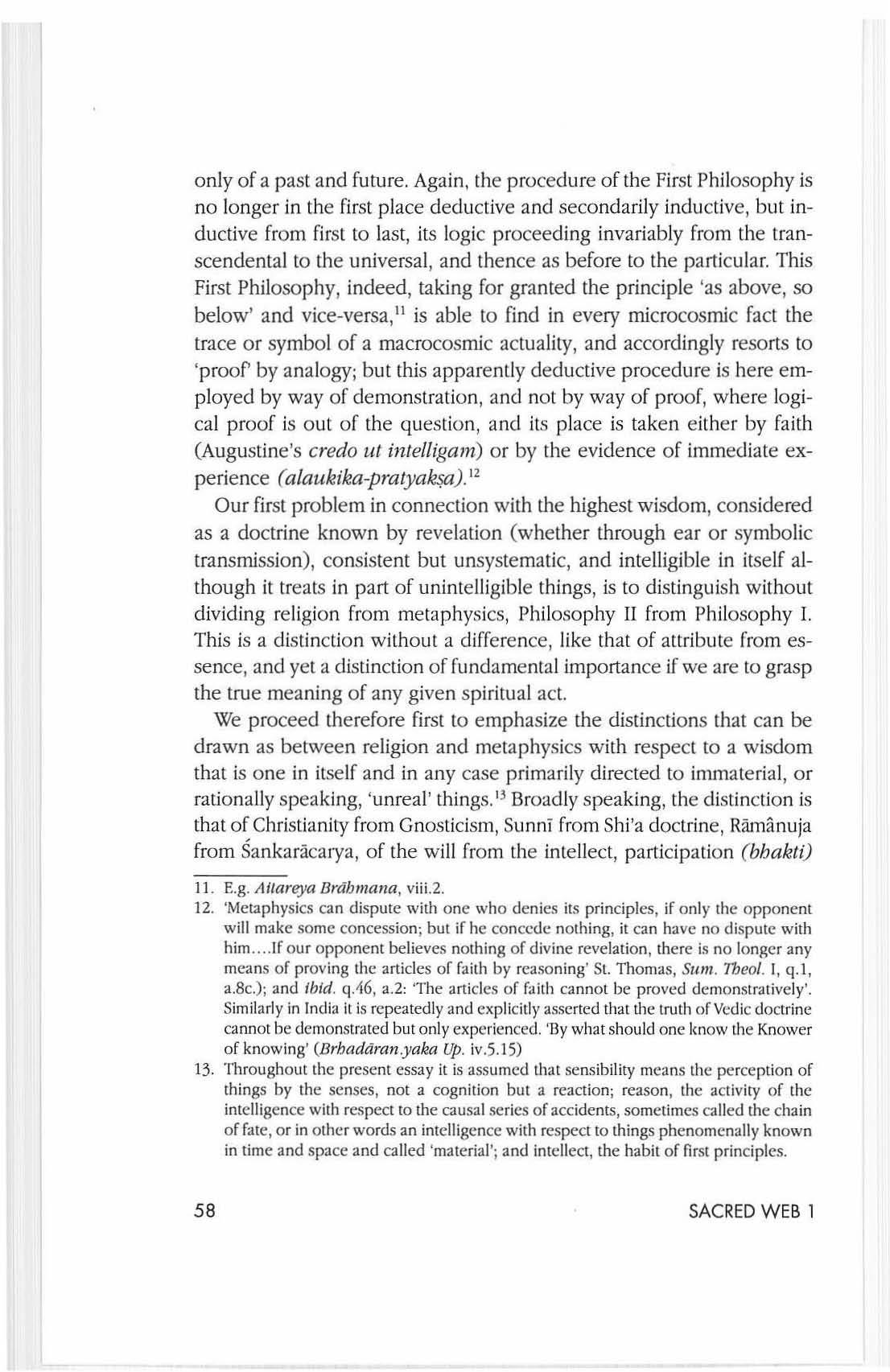
Religion, in general , proceeds from the being in act (kiiryiiv asthci) of the First Principle, without regard to its being in potentiality (kiira/pvas tha) ," a while metaphysics treats of the Sup reme Identity as an indi ssevera ble unity of potentiality and act , darkness and light , holding that th ese can also and must also be considered apart when we attempt to understand their operation in identity in II or Him. And so re ligion assumes an aspect of duality, IS viz. when it po s tulates 'primary maller', ' potentiality ' or 'non- being ' far removed from the actuality of God, and does not take account of the principal presence of this 'primary matter' in , or rather 'o r the First, as it s ' nature ']6
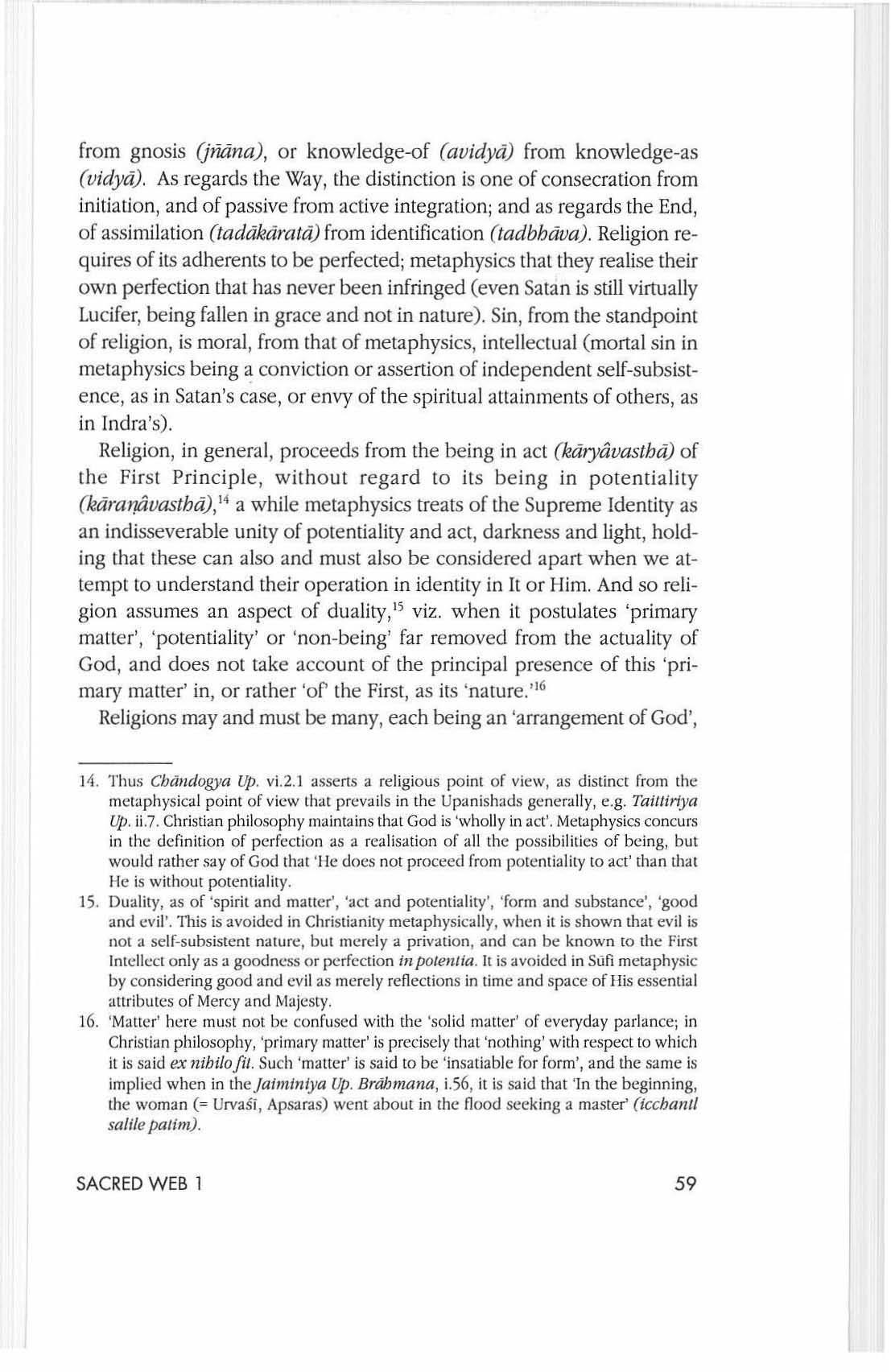
Religions may and must be many , each being an ' arrangement of God ', l-i Thus Chil/u/ogya up. vi.2 l asserts a religious point of view, as distinct from the metaphysical point of view that prevails in the Upanishads generally, e .g Tailtiriya Up. ii.7. Christian philosopby maintains that God is 'wbolly in act'. Metaphysics concurs in the definition of perfection as a realisation of all the possibiHties of being, but would rather say of God tbat 'lie does not proceed from pot e ntiality to act' [han that He is without potentiality. and sty list ica ll y differen tiat ed, inasmu c h as the thing known ca n o nly be in the knower according to th e mod e of the know e r, an d he n ce as we say in India , ' He takes the forms that are im ag in e d by Hi s worsh ippers', or as Eckhart exp resses it , ' I am th e ca use that God is GOd .'17 And this is why religious belie fs, as mu ch as t hey have united me n , have a lso v ided me n agains t eac h othe r, as Chris tian or heath en, o rth odox O f heretica1. 18 So that if we are to consider wha t may be th e m ost urg e nt practical prob le m to be resol ve d by the philoso pher, we ca n o nly a nswe r th at this is to be rec ognised in a co ntrol and rev isi o n o f t h e p rin c iple s of comparative re li g ion, the tru e e nd of w hi c h scie n ce, judged by th e best wisdom (a nd judg ment is th e prope r fun ctio n of applied wi sdo m), sho uld be to demo ns lnil e t he common metap hys ical ba s is of a ll re li gio n s a nd th a t di verse cu lt u res a re fundamen ta lly re la ted to one another as being th e d ia lec ts of a co mmon spi rit u a l a nd intellectual language; for whoever recognises thi s, will no lo nger wish to ass e rt th at 'My re li g io n is best \ but o nl y th at jtis the 'best fo r me '.1 9 In other words , th e purpose of religiou s co nt roversy s hould be, n o1 to 'co nv e rt ' th e oppon e nt , but to persuade him that his religion is esse nlially the sa me as o ur ow n . To c ite a case in point , it is not long s in ce we received a communication from a Catholic friend in which he said ' I've been ashamed for years at the superficiality and c heapness of my attempt to state a diffe rence between Chr ist ians and Hindus ' . It is noteworthy that a pronounce ment such as this will assured ly strik e a majority of European readers wit h a sense of horror. We recognize in fact that religious controversy has still generally in view to convince the opponent of error rather than of correctness in our eyes; a nd one even detects in modern propagandist writ ing an undertone of fear, as th ough it would be a disaster that might upset o ur own faith, were we to discover essential truth in th e opponen t; a fear which is occasioned by the very fact that with increasing knowledge and und erstanding, it is becoming more and more d ifficult to estab li sh fundamental differences as between one religion and another. It is one of the functions of the First Philosophy to dissipate such fears. Nor is there any other ground whatever upon which all men can be in absolute agreement, excepting that of metaphysics , which we assert is the basis and the norm of all religious formulations. Once such a common ground is recognised, it becomes a simple matter to agree to disagree in matter of details, for it will be seen that the various dogmatic formu lations are no more than paraphrases of one and the same p rin c ipl e. 20
15. Duality, as of 'spirit and maner ', ',Jet and potentiality', ' form and substance', 'good ilnd ev il '. This is avoided in Christian ity metilphysically, when it is s hown th at evil is not a self-subsistent natur e, but merely a privatio n, and can be known to Ihe Firs t [ntdlect only as a goodness or perfection ill potentia. [I is avoid<."(] in Sufi metaphy sic by conSidering good and evil as merely reflections in time and space of I lis essential attributes of Mercy and Majesty.
16. 'Maner' here must not be confused with the 'solid matter' of everyday parlance; in Chr isti;m philosophy, 'primary matter' is precisely that 'nothing' with respect to which it is said ex IlihiloJil. Such 'm,lller' is sa id to be ' insatiable for form', and the same is implied when in theJaimtntya Up. BrahmalJa, i.56 , it is said that 'In the beginning, the woman (; Urvas!, Aps3ras) went 3boul in the flood see king a master' (tcchalltl salile palim).
17 Th e physical analogy is represented in the asse rt ion of th e anthrop o logist that 'God is man -made '; a proposition perfectl y va lid wi th in the con d it ions of its own level o f refe rence.
18. That is main ly, of course, in Europe fr o m the thirteenth cen tu ry o nw ard In I lindui sm, a man is rcgardcd a s a tr ue teacher w ho gives to any individual a bcner access to that individual's own sc ripture s; fo r 't he pat h that men take from every side is Mine ' (Bhag a vad Gfld, iv. II ) Clement of Ale xandria allo w s that 'There was a lw ays a natural manifes tati o n of the One Almight y God am ongs t a ll right -thi nkin g men' (Misc., v); Eckhart says a lm os t in the wo rd s of t he Bbagavad Gfld cited ab ove, ' In whatever way yo u find God best , that way pu rsue; Dante will not exclude a ll thc pagan p hil osophe rs from He aven; in th e Grail tradition, Malory s ay s that 'Merly n made the round table in tokeny ng of the roun d e nc s of the world fo r by the round table is th e world sygni fyed by ryghte. For a ll the world crysten an d he th en re pay ren voto the roun d ta bl e' (Mort d 'Arthll r, xiv.2); th ese ma y be contrasted with th e pos it ion taken in the Song of Holand where , when Saragossa h as bee n taken, 'A thousand Franks ente r the synagogues and mosques , whose every wall with mallet and a xe they shatter. the heathen folk are driven in crowds to the baptismal fonl, to take Christ's yoke up on them' .
19. The 'bes t for me ' need not be 't ru est abso lut e ly ' a s judged by absolute metaphysical s tanda rd s. Nevertheless, the metaphysician will not s ug gest that th e followe r of a 'second best ' religion sh ould aban d on it for anot h er (cf. Bbagavad Gild, iii.26 , lla buddhibbedamjallayed ajmillam) , b ut rather that he goJarth er III where he already is , and thu s veri fy as ·true' his own images, nOI by those of a nother pattern, b ut rat her by the prior for m that is common to bo th .
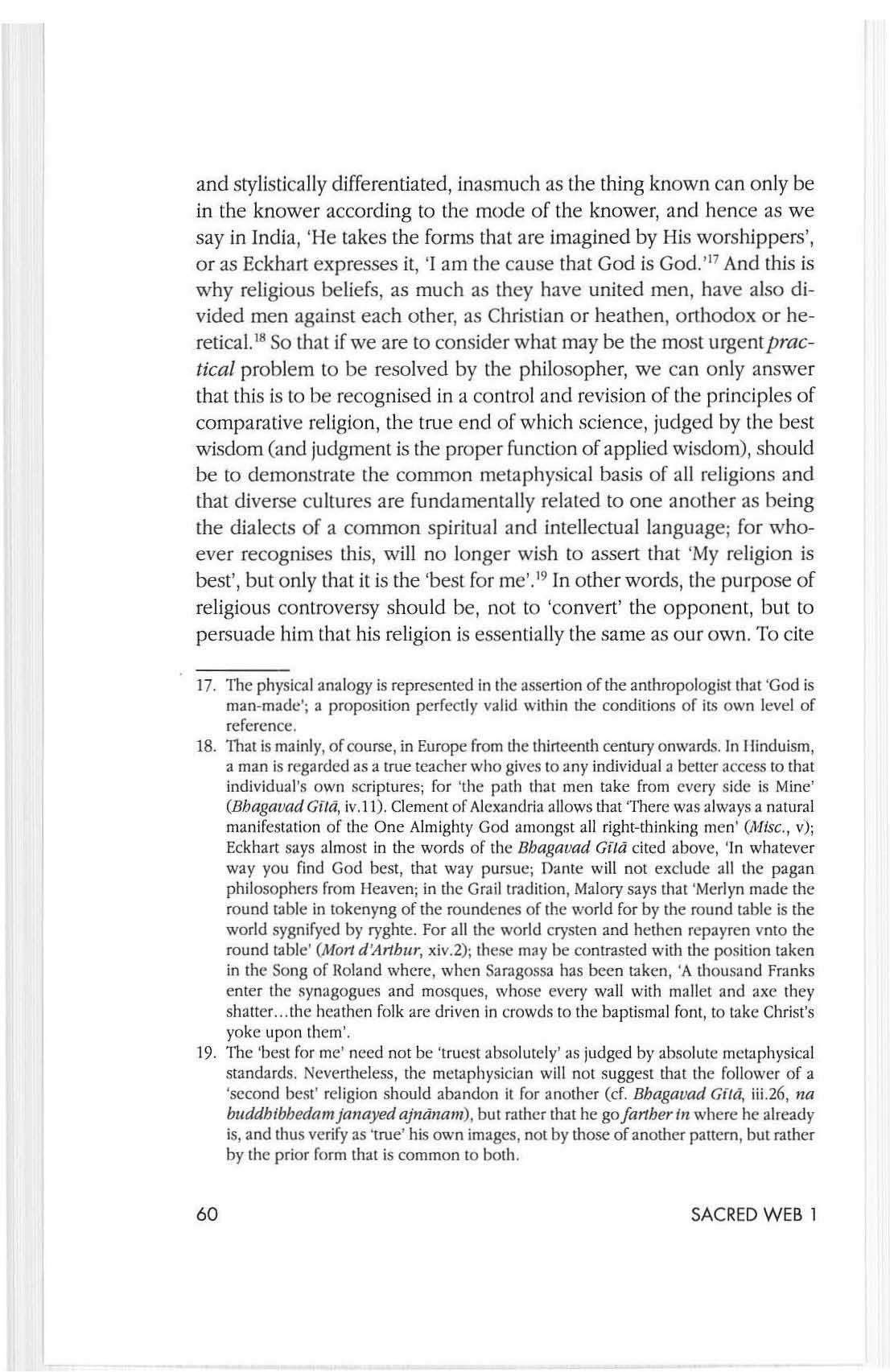
Few w ill deny that a t th e present day Western civilisation is fa ced with the imminent possibilily of total functional failure nor that at the same lime thi s civilisation has long acted and still cont inu es to act as a powerful agent of disorder and oppression throughout th e rest of th e world. We dare say that both of these conditions are referable in the la st analysis to that impot e nc e and arrogance which have found a perfect exp ression in th e dict.um 'East is East and West is West, and never th e twain s hall meet ', a proposition to which only the most abysmal ignorance and deepest discou ragement could have given rise. On the o th er hand, we recognize that the only possible ground upon which an effective entente of East and West can be accomplished is that of the purely intellectual wisdom that is one and the same at all times and for a ll men , and is independent of all environmen tal idiosyncrasy.21
20. ' Diverse d ogma tic formulations' , i,c. dbarma parydya as thi s expression is em plo ye d in the Saddbarma PllI!l1arlka 21. In this context , the reader is recommended to Rene Guenon, L 'Orlent et I'Occfdell/, 1932.
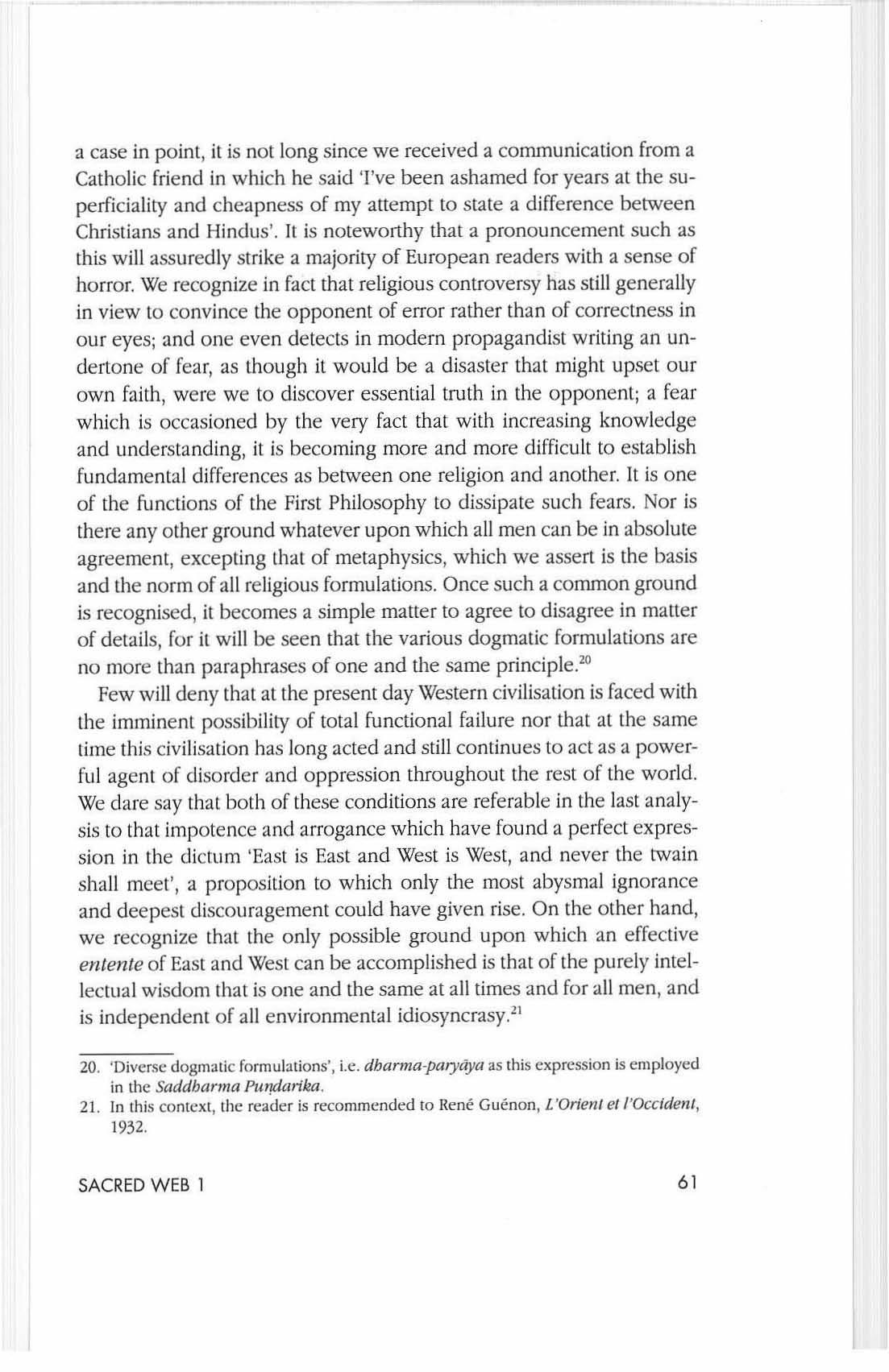
We had intended to dis c u ss at g reater le ngth th e differe ntia of relig io n and metap hysics, but sha ll rather conclu de the presen t sect io n by an as ser ti o n o f th e ir ultimate identity . Bo th , co n sid ered as Ways, or praxis, are means of accomplishi ng the re c tifi ca tion , regenerati on and reintegration o f th e aber ran t and fragmented individual co nsciousness , both conceive of ma n 's last e nd (puru¥irtha) as co ns is tin g in a rea li sa tion by the individual of a ll the possibilities inh e ren t in h is own being, or may go farther, a nd see in a rea lisatio n o f a ll th e possibi lit ies of b e ing in any mod e and al so in p oss ibiliti es of non-b e ing, a fin al goal. For th e Ne oPlatoni sts and Augustine, and agai n fo r Erige na , Eckhart an d Dante , and for s uc h as Rlimi , Ibn 'Arabi , Sal)karacarya, a nd m a n y o th e rs in ASia , religious and inte llec tu al experience ar e too close ly interwoven eve r to be w ho ll y d ivided;" w ho fo r exa mpl e wo uld ha ve s uspected th a t the words ' How ca n That, w hi c h th e Compre he nding call th e Eye o f a ll things, the Intellect o f intellects, the Ligh t of lights, and numin o us Omnip resence , be ot he r than man 's las t e nd ', an d '11lOU has b ee n touc hed and taken! lo ng ha s Thou dwelt apart from me, but n ow that I have found T hee, I s hall never let Th ee go ' , a re taken, not from a 't he istic ' so ur ce, but from pure ly Vedan ti c hym n s addressed to the Essence (a lm an) and to th e "impersona l" Brahman?!
ll. How Divers Wisdoms Have Considered Immortality
Let us n ow co ns ider the app li ca ti on o f different kinds of w is dom to a parti cu lar p ro bl e m of general s ign ifi ca nce . Th e pertin e n ce of p h ilosophy to th e prob le m of immorta li ty is ev ident , ina s mu c h as w isdom is primarily co ncerned with imm a teria l thi ngs , and it is ev id ent t ha t ma teri a l things are not immortal as s u c h (in esse per se), nor eve n from one moment to anothe r, bu t are co n ti nually in flux , and thi s is undeniable , rega rdl ess of w he the r there may o r may not be in s uc h perpetually b ecomi ng thin gs so me immortal principle. Or to regard th e ma He r from
22. Cf. Erigena, De di u. nat urae, i, 66, Ambo slq utdem ex Ima JOllie, dlvi ll a s etli ce l saptel1lta , IIltmare dubiurn 110 11 est , and Bbagavad Gfta, vA -5, 'i t is the c hil dren of this world , and not th e men of le arning wh o think o f gnosis and works as d ifferent ... He sees in truth who sees that gnosis and works are one' (fo r Siirilkhya a nd Yoga as meaning gnosis and works respectively, sec ibid, iii.3). 111at th e Way o f Gnosis a nd the Way of Participation have o ne and the sa me e nd becomes ev ide n t when we cons id e r that love and know ledge can on ly be conce ived of as perfected in a n ide ntit y of lover and be loved, kno we r a nd kn ow n another ang le , we may say that whatever, if anything , there may be immorta l in phenomenal things must have been so since time began, for to speak of an immortal principle as having become mortal is th e same thing as to say it was always mortal.
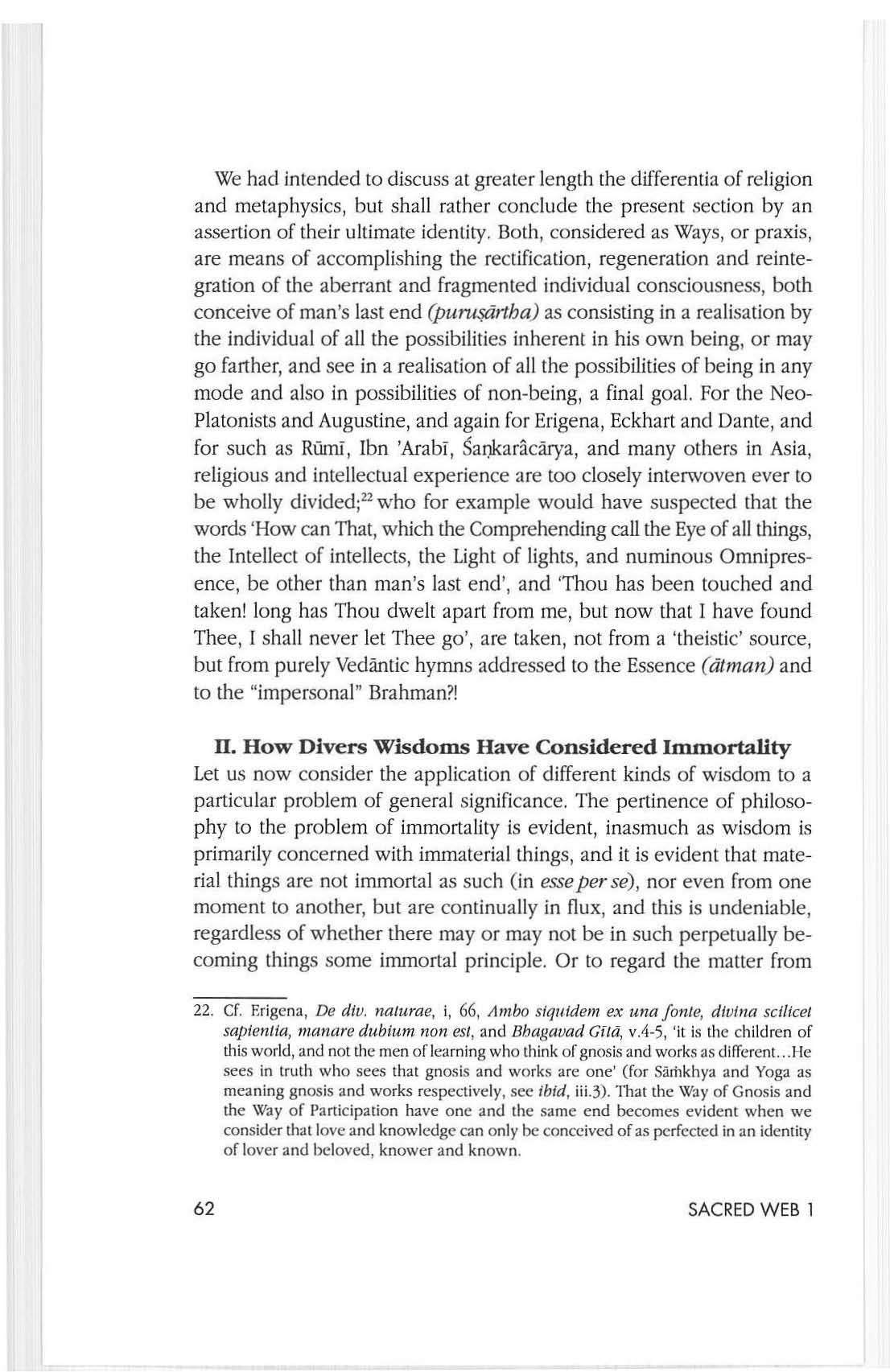
It needs no argument to demonstrate that human wisdom, rationalism, our Philosophy II, will understand by 'immortality', not an everlas ting life on earth, but an after-death persistence of individual consciousness and memory and character, such as in our experience survives from day to day across the nightly intervals of death-like sleep. Rationa l wisdom then will take up e ither one o f two positions. It may in th e first place argue th at we hav e no experie nce o f nor can conceive of the functioning of co nsc io u sness apart from the actual physical bases on which the fun ction ing seems to rest, if indeed consciousness be in itself anything whatever more than a function of matter in motion, that is to say of physical existence; and will not therefore conceive the possibility of any other than an immortality in history , viz. in the memories of other mortal bei n gs. In this sense there can also be postulated the possibility of a kind of resurrection , as when memory is refreshed by the discovery of documentary proofs of the existence of some individual or people whose very names had been forgotten , it may be for millennia. Or human wisdom may maintain, rightly or wrongly, that ev id ences have been found of the 's urvival of personality', viz. in communications from the 'o ther world ', of such sor t as to prove either by reference to facts unknown [Q the observer, but which a re afteIWards verified, or by 'manifestations' of one sort or anOlher, a co ntinuity of memory and persistence of individual cha rac ter in th e deceased who is assume d to be in comm unication with the observer. If it is then attempted to rationalise th e evidence thus accepted, it is argued that there may be kinds of matter other and subtle r than those perceptible to our present physical senses, and that these other modalities of matter may very well serve as the suppositum of consciousness functioning on other planes of being.
It will be readily seen th a t no spiritual or intellectual dist in ction can be drawn between the two rationalistic interpretations, the only differe nce between th em being as regards the amount or kind of time in which the continuity of individual character and consc iousness ca n be maintained in a dim e nsioned space and on a material basis , theories of ;fourth dimensions' or of 's ubtle matter' changing nothing in principle Both of the rationalistic interpretations are re jected in toto, equally by religion and metaphysics.
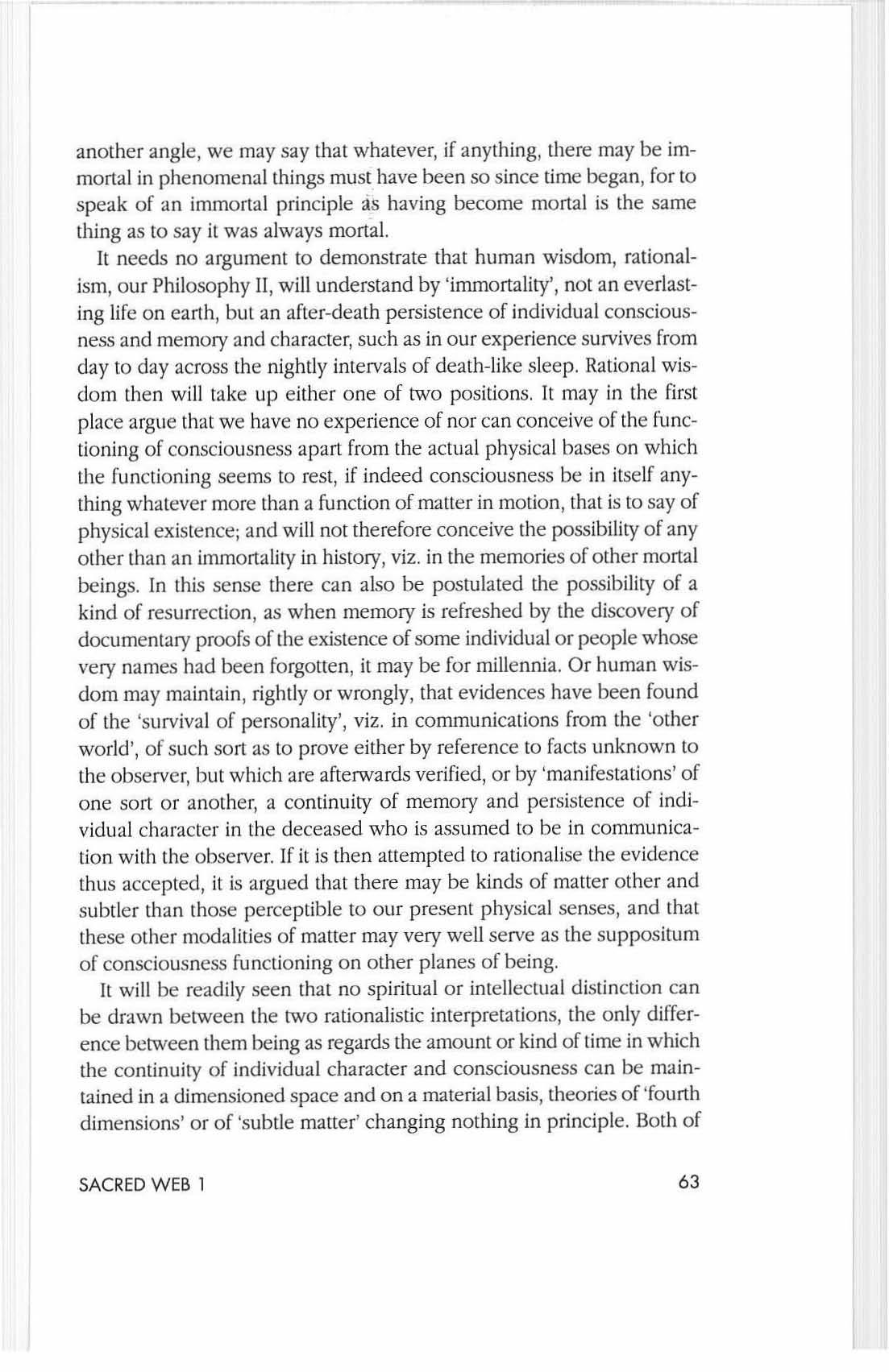
Not that the possibility of an indefinite perdurance of individual co nsciousness upon indefinit ely num erous or various platforms of being and in va ri ous tempora l modes is by any means denied in religion or in metaphysics (it being rather assum e d th a t individual consc iousness eve n now functions on other levels than those of our present ter restria l experience),Z 3 but that a persistenc e in such modes of being is not, strictly speaking, an immortality, this being taken to mean an immutability of be ing without deve lopment or c hange and wholly uneventful; while that which is thu s presumed to subs ist apart from contingency , viz , the soul, form or noumenal principl e (nama) of the individual , by which it is what it is, must be distinguished alike from the subtle and the gross bodies and sthtiiasan-ra) which are equally phenomenal (nipa), as being wholly intellectual and immaterial."
For example, 'th ings belonging to th e s tat e of glory are not under the sun' (St. Thomas, Sum. Tbeol., iii., Sup. , q.l, a.I), i.e . not in any mode of time or space; rather, ' it is through the midst of the Sun that o ne esca p es altogether' (alimucya te) , Oaiminfya Up. Brahmana, i.3. ), where the sun is the 'gateway o f th e worlds ' Ooka-dvara), (Chand. Up. , viii.6.6) , Eckhart 's 'gate through which all things return perfectly free to th eir s upreme felic ity (piinulnanda). . .free as the Godhead in its non- ex is tence ' (asal), the ' Door' of J o hn X, ' Heaven's-gate that Agni opens' (sva.-gasya lokasya dvaram aVl"not), (Aitareya Brahmana, iii. 42).zS It is true that here again we shall inevitably meet with a certain and by no means negligibl e distinction of the rel igious from the metaphysical fo rmulation. The religious concept of supreme felicity culminates as we have already seen in the assimilation of the soul to Deity in act; the sou l's own act being one of adoration rath e r than o f uni o n. Likew ise, and without in co n s iste n cy, s in ce it is assumed that the individual so ul rema ins numerically dis tinct a li ke from God and from ot he r substances, religion offers to mortal c onsc iousness the conso latory promise of finding there in Heaven, not on ly God , but those whom illoved on earth , an d may remember and recognize.
23. ' Even we ourselves as mentally tasting so mething eternal, are not in this world ' : St. Augustin e , De Trin. iv.20.
21t. 111crefore in c apable of 'proof', whether th e phenomena adduced be 'scientific' Of 'spiritual isti c'.
25. While it is shown here how Ihe formulation s of different religion s may express the same conceptions in almost ver bal agreement, it must not be supposed that we therefo re advocate any kind of e cclecticis m , or conce ive the possibility o f a new religion compounded of all exis ting religions. Ec clecticism in religion results o nly in confusion and caricature , of which a good example can be cited in '·!1l cosophy'.
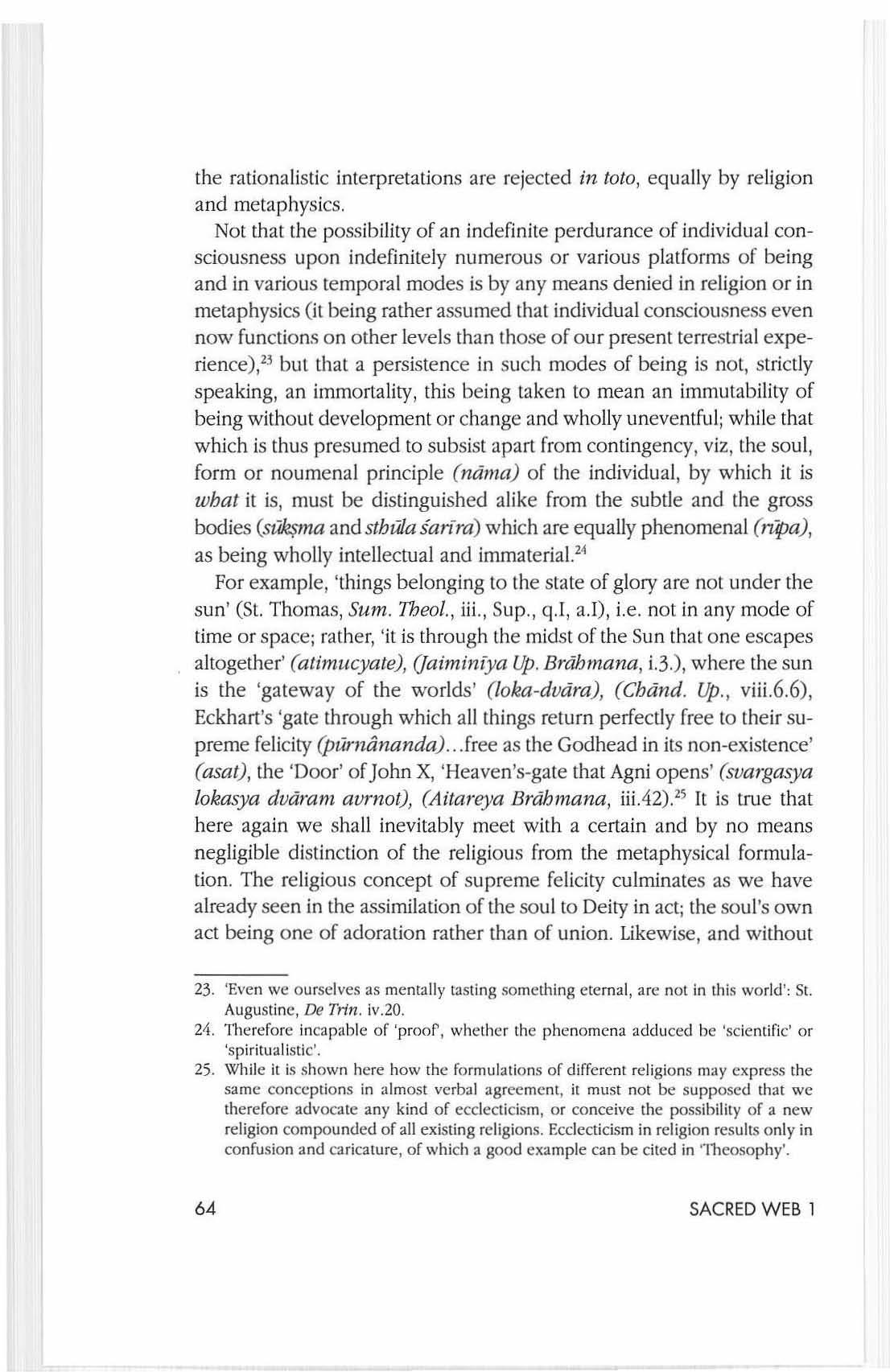
Nor will metaphys ics deny even in a ' Heaven ', on th e farth e r s ide of time , there may be , a t lea st until the 'Last Judgment ' , a know le dg e-of (av idya) rath e r t h an a knowledge-as (vidyii), though it will not think of him whose mod ality is s till in know ledge-o f as who ll y Comprehend ing (vidvcill) n or as abso lut e ly Enlarged (alimukta). Metaphysics wi ll a llo w, and he re in formal agreeme nt with re ligion , that ther e may o r even must be states of b e ing by no means wholly in time , nor yet in e te rnity (the ti meless now) , but aev iterna l, 'aeviternity ' ( Vedi c amrtatva) being defined as a mean between etern ity and time; 26 the Angels , fo r example, as conscio us int e ll ect u a l s ub s tan ces, partaking of e ternity as 10 their immutabl e nature and un derstanding , but o f time as regard s their acci d e nt a l aware ness of before and after, t he changeab ility of thei r affections (lia bilit y to fall from grace , etc.) and inasmuch as the angel ic independence of local moti o n (because of which Angels are represen te d as winged , and spo ke n of as ' birds') ," whereby they can be anywhere, is other than the immanence of th e Firs t, which imp lies an equal presence everyw he re. Nor is it denied by religion that 'Certain men eve n in thi s sta te of life are greater th an certa in angels, not ac tu a ll y, but virt ually ' (St. Thomas, Sum. Theol., i, q .l1 7, a.2, ad.3), whence it nat urally follo ws th at 'Some men are taken up into the high es t angelic o rd ers' (G regoT)', Hom. in Ev. xxxiv), th us p artaki ng of an aev it erna l being ; a ll of w hi c h corresponds to what is implied by the familiar Hindu expressio n devo bbl1tva, equ iva len t to 'dead and go ne to Heaven '. Preci se ly this pOint of v iew is more technically expressed in the critica l text, BrbadararJyaka up. , iii.2.12 , 'W h en a man d ies, w h at does not forsake (na jabat;) him is hi s 'so ul' (nama)," the sou l is w ith ou t end (ananta, 'aev itemal'), w ithout end is what th e Seve ral Ange ls are, so th e n h e wins th e world everlas ti ng' (an a n tam lokam). Cf, Rilini (xii in Nic holson's Sbams-i-Tabr'-z), 'Eve ry shape yo u see has its archetype in th e p lace less world, and if th e s hape perished , no matter, si nce its o ri gi nal is everias Li ng ' (Idmkan-asl)j and Sl. Thomas, Sum. Theol., ji - i, q.67, 3.2c , 'as regards t he in te lli gible species, wh ich a re in the possible inte ll ect, the intellectual virtues remain ', v iz. whe n the b ody is corrupted. TI,is was also ex p o u nded by Philo, for whom ' Le lieu de ce tte vie immo rt e lle es t Ie monde inle lli g ib le',29 that is to say th at the same as the ' In te ll ect u a l Realm ' of PIOli ntl s, passim. If we n ow co nsider the impli ca tions of these d icta in con nection w ith B6hme 's a nswer to the sc holar who enqu ires, 'Wither gaeth the so ul when the body dieth", viz. (h at 'There is no necessity for it togo anywither ... For ... whichsoeve r of t he two (that is eithe r heaven o r hell) is manifes ted in it (now), in tha t the soul standeth (t h en) th e judgment is, in deed, imm edia tely at the d eparture of the body ','" and in th e light o f Brbadaranyaka Up., iv.4.5-
26. St. 'Ih omas, Sum 7b eo l i, q.IO , a.5 He says 'states of being ' in the plural delib e rately (cf I{Cnt! Gue non, Les Elals mulliples de L 'Etre, 1932) , although fo r purposes o f ge nerdlization it ha s been necessary to speak of on ly thr ee, viz. the human, angelic and div ine , that is to those which the liter a l , metaphori c al and ana logic al und e rstandi ng s p e rtain respectively With the Christian 'aevitc rnity ', Indian amrlalva , and the traditional con ce pt of 'humanity' and Pe rfec t Man (e g Islamic insall III-ka lil /I), cf jung , M od em Man Itl Search oj a SOlil, p . 215: ' If it were permissible to perso nify tb e un co nscio us, we mi g ht call it a co ll ec ti ve human being combining the chara cteri stics o f both sexes, transcending yout h and age, binh and death , and from ha ving a t its comman d a hu man exper ie nc e o f o ne or two million years, almo st imm ortal. If suc h a being ex isted, he would be exal ted above a ll temporal change he would have li ve d cou ntk-ss tim es over the liCe of the ind iVidua l, o r th e family , tri be and pe ople, and he wou ld possess Ihe li ving se nse of rhythm of growth , flowering and d ecay. It wo u ld be pos iti vely grotesque of us to ca ll this immense system of the expe rien ce of th e unco nscious psyc he an illusion'. Here it may be noted that 'u nco nscio us' prese nts an analogy with ' Deep -Sleep ' (susllp li • samtidbi = e.xcessus or rap/lts)i on th e other hand , the usc of lh e word 'colle ctive' be trays a purely SCientific, and no t a meta phys ical conce ption.
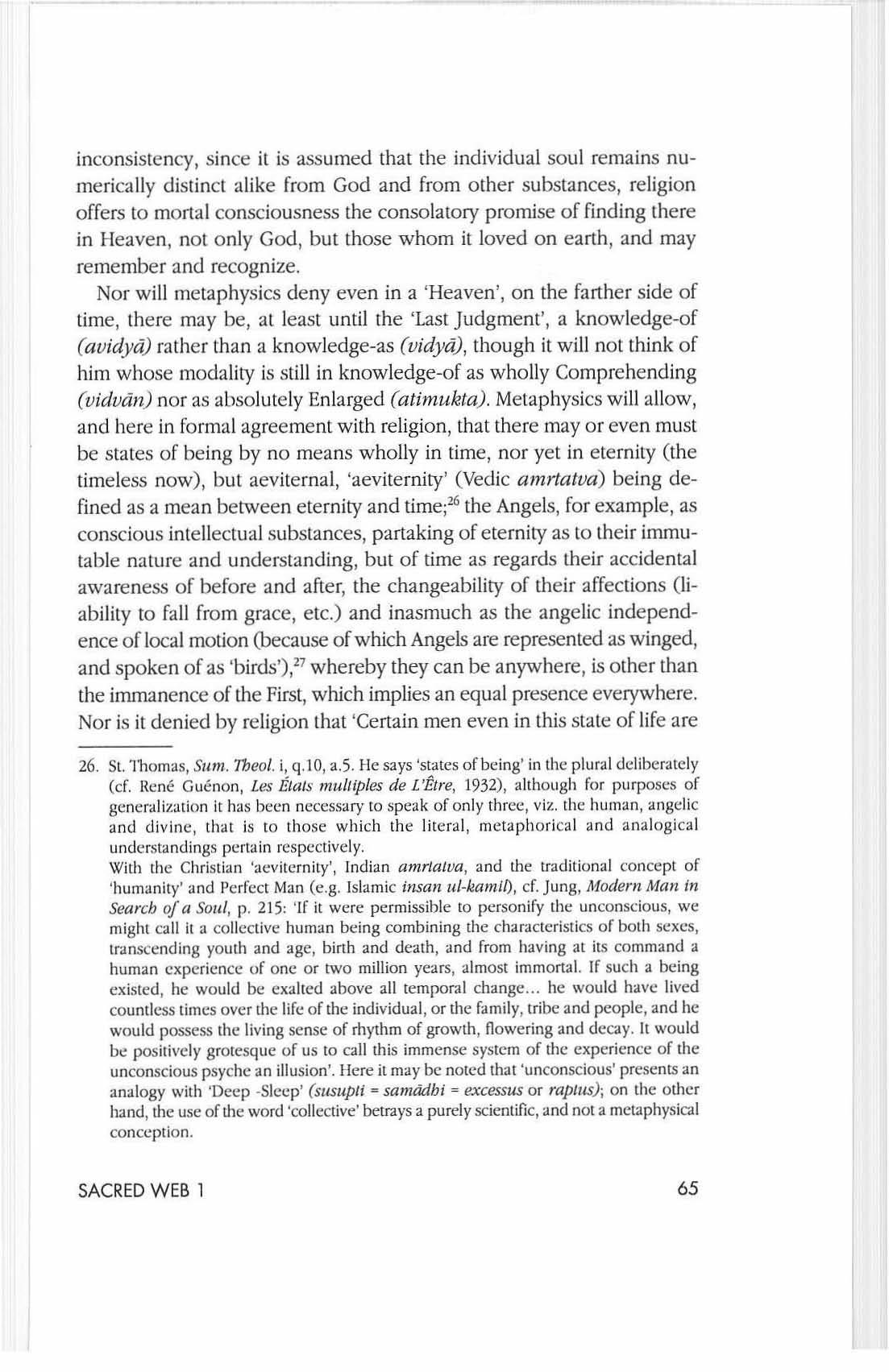
6, 'As is his will 5 0 is hi s lot' (y at kcilllam Iat samp adya te) and ' He whose mind is attached (to mundane things) re turn s again to this
27. 'Intellec t is the swiftest of birds ' (manah palayalStl altab, Rg Veda, vi.9.5). It is as birds that the Angels 'ce lebrate in th e Tree of Life their s ha re of 3eviterni ty ' (yatra supamd amartasya bbdgam abhf svaran ti, ibid i.164.21). The traditional expression 'language o f bird ' (w h ich survives in ' a little bird told me ') refers to angelic communicatio ns.
28. Nama is the correlative of nipa, being the noumenal or intelligible part and efficient "IUSC ofthc integration Ilama-nipa , viz. the individual as he is in him self; and therefore to be rend ered not by 'name' (for this is not a nominalist but a realist doctrine), but by 'idea', 'archetype', 'form' or 'soul' (as when it is said 't he soul is the form of the body'); a/mall on the othe r hand being 'essence' rath er than 'sou l' (essentia, that by which a substance has esse in whatever mode) world but he whose desire is the Essence (iilman), his life (pralJiih) does no t leave him , but he goes as Brahm an unto Brahman ', it will be apparent that a lth ough the sou l or intellect (Ved ic manas) is immortal by n ature (i.e. an indiv idu al potentiality that cannO l be annihilated , w hatever ils 'fa te '), nevertheless the actual 'fate ' of an indi vidual conscio usness, whet her it be d esti ned to be 'saved ' or ' liberated' (devayiina), or to enter into lime aga in (pilryiina), or to be ' lost' (nin1ha), depends upon itself. And therefo re we are to ld to 'Lay up tr easure in Heaven, where neither moth nor rust corrupt'; for evidently, if th e conscious life of th e in divi du al be eve n now established intell ec tu ally (o r in relig iou s phra seo logy, 's piri tually'), a nd the int e ll ect ua l or sp iritual world be ae viternal (as follows from the consideration tha t ideas have neither place nor date), this consc ious Ijfe ca nnot be infringed by the death of th e body , wh ich changes no thing in this respecl. Or if th e consciousness be st ill attached to and involved in ends (w het her good or ev il ) such as ca n only be accomplished in time and space, but have not yet been accomp li shed when th e body dies, then evidentl y such a consciousness w ill find its way back into those co ndition s, viz. of space and time, in which th e desired ends can be accomplishe dY Or finally , if conscious life has been led altogether in the nesh , it must be th ought of as cu t off w hen its so le support is destroyed; that is , it must be th ought of as ' ba cks li ding' into a mere potentia lit y or hell.
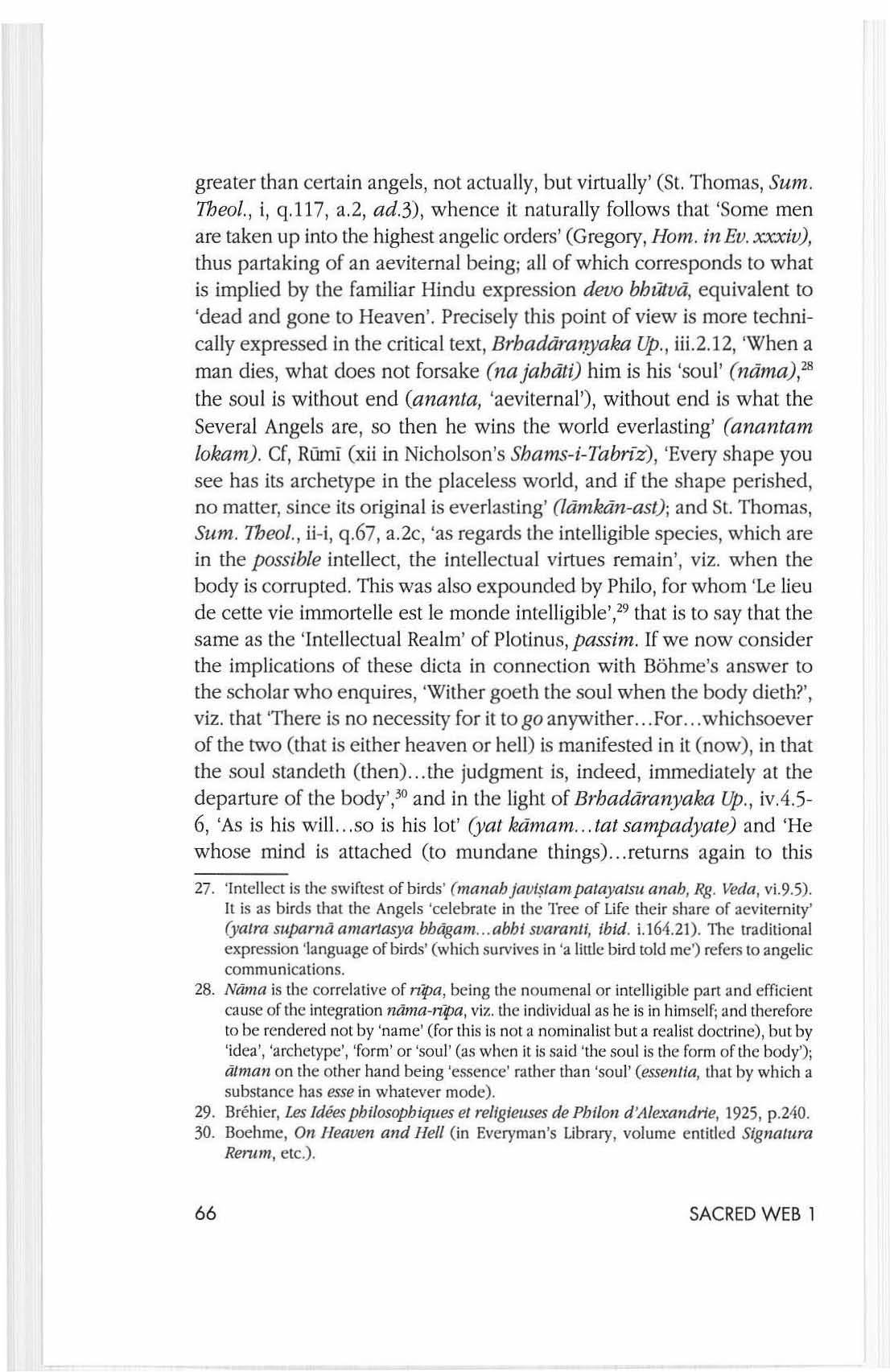
29. Brehier, Les Idees pbllosophiques e/ religlellses de Pbi/oll d 'lIlexandrle , 1925 , p .240.
30. Boehme, On Heaven and Hell (in Everyman 's Library, volume cntitled Signa/11m Remm, CIC .).
Space w ill not permit us to discuss th e theol)' of 'reincarnation ' at any lengt h. The fun damenta ls are give n in the Rg. Veda, where it i s pr imar il y a matter of recurring manifes tati on, in thi s sense for examp le, Mi tra Jayate punah (x.8;. 19 ) an d U:;as ispunahpunarjiiyam iina (i.92.10) An indivi dual app li cat ion in the spiri t of 'Thy will be done ' is found in v.46. 1, 'As a comprehend ing (v ic/viin) horse [ yoke myself unto the pole (of th e chariot of the year) ... seek ing neit her a release nor to come back again (na asydh vimucam. na dvr lt am punah), may He (Agni) as Compre hende r (v ic/van) and ou r Waywise Guide lead liS aright'. The indi vidua l, indeed, 'is born according to th e measure of his understanding ' (Ailareya Aranyaka, ii.3.2) , and just as 'th e wo rl d itse lf is pregnant with th e causes of unborn things' (Augusti ne , De Trin., iii. 9), so is th e individual pregna nt with the acciden ts that mu st befall him ; as St. Tho31. It is the good purpose, for example, which operat es in the return of a Bodhisattva, who is otherwise rit for Nirvana. SACRED WEB 1 mas expresses it l 'fate is in the created causes themselves l (Su.m ?heal, i, q .l16, 2), or Plo tinus, 't h e law is g iven in the entities upon whom it falls ... it prevails because it is within them ... and sets up in them a painful longing to enter the realm to wh ich they are bidden from within' (Enneads , iv.3.15) ; and similarly Ibn ' Arabi, who says that wh il e being is from God, modality is not directly from Him , 'for He only wills what they have it in them to become ' (Nicholson, Studies inlslam-ic Mysticism, 1921, p.151). On the other hand , it may be taken as certain that the Buddhist and still more the modern Theosophical interpretations of ca usality (karma) or fate (adr$.!a )1 wh ich assert the necess it y of a return (except for one who is mukta or has ' reached' nirodna) to the very same conditions that have been left behind at deat h , involve a metaphysical antinomy ; 'Yo u would not step twice into the same wa ters, for other waters are ever flowing in upon you' (Heracleitus). What is rea ll y contemplated in Vedic and other traditional doctrines is the necess ity of a recurrent manifestation in aeon after aeon, though not again within one and the same tempo ral cycle, 3l of all those individua l potentialities or forces in which the desire to 'pro long their line' is still effective; every Patriarch (pitr) being, like Prajiipati hi mse lf,praja-klimya, and th erefore w illingl y committed to the ' Patriarchal Way' (pitryana).
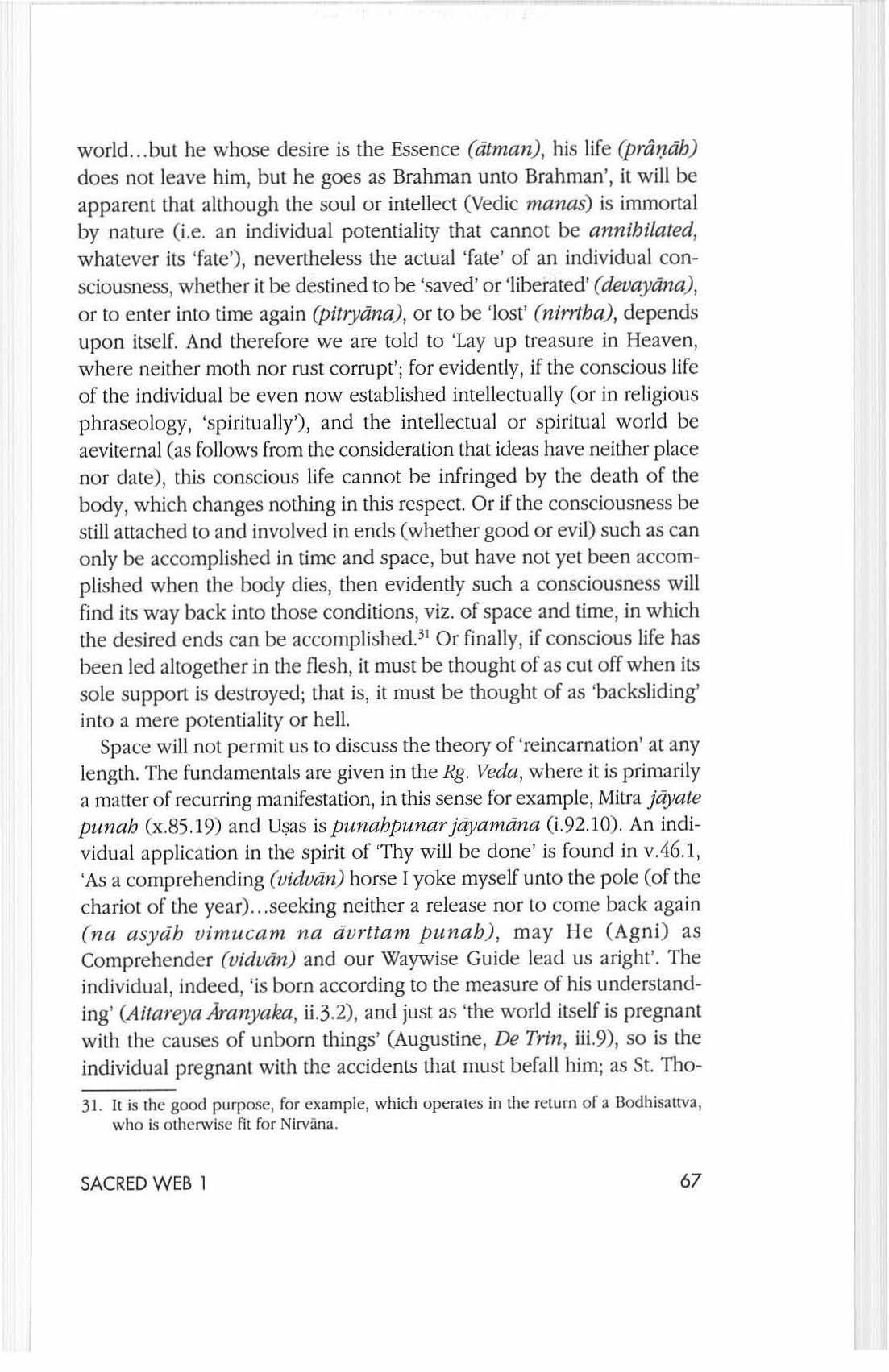
What is th e n from the standpo in t of metaphysics the who le course of an individual potentiality , from the ' time ' that it first awakens in the primordial ocean of universal possibility until the 'time' it reaches the last harbour' It is a return into the source and well-spring of life, from which life originates, and thus a passage from o ne 'drown ing ' to another; but w ith a dist inction, valid from th e sta ndp o int of the individual in himself so long as he is a Wayfarer and not a Compre h ender, for, seen as a process , it is a passage from a merely possib le perfection throu gh actua l imperfection to an actual perfectio n , from potentiality to act, from s lumber (abodbya) to a full awakening (sambodbi). Ignoring now the Patriarchal Way as being a 'round about' course, and considering on ly the s trai g ht Angelic Way (devayana), with which the Rg. Veda is primaril y and the individual 1nLUnuk$u specifically concerned, we may say that thi s Way is one at first of a dimi nishing and aftelWards of an in creas ing reali sa tion of all the possi bilities intrinsic to the fac t of being in a given mod e (t he human, for examp le) , and ultimatel y lea ds to th e rea li sa tion of all th e possibilities of bei ng in an y o r every mode, and ove r and beyond thi s of th ose of being not in any mod e whatever. We ca nn ot do more t han a ll ude here to the p art that is tak en by what is call ed ' initiation ' in thi s co nn ec ti on j on ly saying that the inten ti on of initiati on is to cO llliTIuni cate from one to anot he r a spi rit ual or rath er intell ec tual impulse that has bee n continu ously tran smitted in guru-parampara-krama from th e b eg inning a nd is ultim a te ly o f non-human origin , a nd whe reby th e co ntr act e d and di s integrated indi vi dual is awakened to th e poss ibility of a re integration (sa mskarana)," and th at metaphysical rit es, o r ' mysteries ' (w hich are in imitation of the means emp loyed by the Fath er to accomp li sh Hi s ow n reintegration, the necess ity for w hic h is occasioned by th e in cont in ence of the creat ive act) , are , like the ana logous traditional sc riptures, int ended to provi de the individu al with th e necessary preparatory educat ion in and means of intellect ual operat ion; but th e 'Great Work ', th at of accomplishing th e reunion of essence w it h Essence , mu st b e d o ne him se lf wi th in himself.
32. In BhagaIJ(ld Gilil, viAl, for example, SdsafJIfsamii is very far from implying 'fo rthwith' .
We doubt very much whether any Upani sbad passage could be c ited as implying a re-embodiment otherwise (han at the dawn of a new cycle, and then o nly as the growth o f a seed sow n in the previ ous aeon, or as a tendency with which the new age ca n be said to be pregnant.
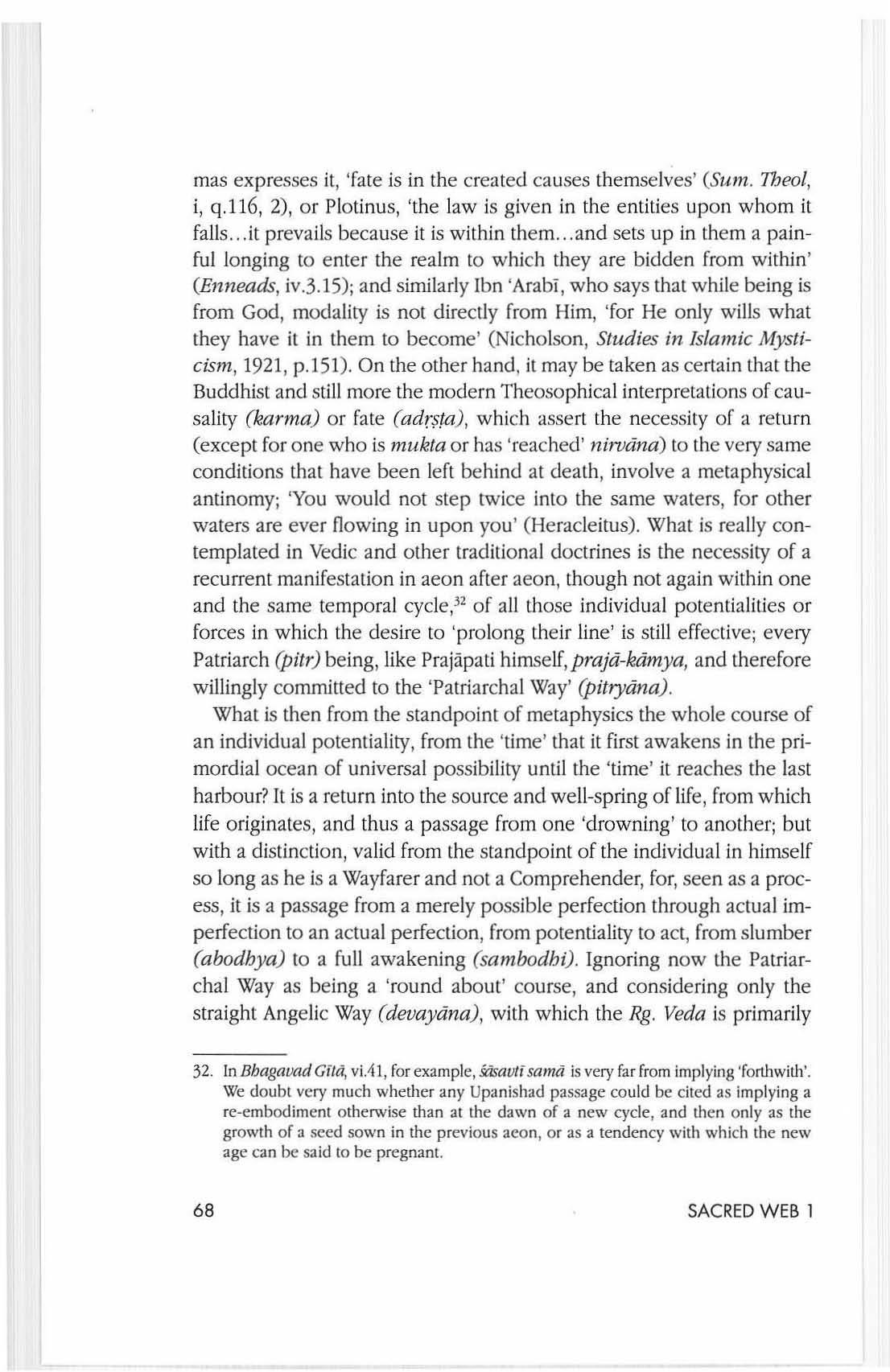
We hav e so far fo ll owed the Wayfarer 'S course by th e Ang e li c Way to the s piritual or int e ll ec tual rea lm ; and here , from the re ligio us point of view , li es his immorta lity, for indeed 'the du ration of aevitern ity is in finit e' (St. Thomas , Sum 7b ea l., i, q .lO, a.5, ad.4 .) But it w ill b e maintained in metaphy sics, or eve n in a religion or by an in divi du al mystic such as Eck har t (in so fa r as th e religiou s exper ience is both devotional and intelle ctual in the de epes t se nse of both wo rd s) that an aeviterna l stati on (pada), such as is impli ed in th e concept of bein g in a heave n, is no t the e nd , nor by a ny means a full return (n ivrt tl) , but only a res ting pl ace (viSrama)" And likewise, it will b e maintained that to co nce ive of the intellectua l realm itse lf as a p lace o f mem ories would be a deroga- tion, for as Plotinus says of its natives, 'if they neith er seek nor doubt , and n ever learn, nothing being at any time absent from their knowledge ... what reasonings, what processes of rational investigation , can take place them' In other words, they have seen God and they do not recollect? Ah , no ... suc h reminiscen ce is only for sou ls that have forgotten ' (Enneads , ivA.6); " and still more must we say re specting mundane memories (vci.sana) that ' when the soul's act is directed to another order, it must uuerly reject the memory of such things, over and done with now ' (ibid, iv.4.4.8).
33. S(.'C Aflare)'a Am1/Y(lka , ii i.2.6; Ailareya BraiJmana , vi.27; Satapalba Brtihmana , vii.!.2. ! and passim. cr. also Guenon , 'L' l nitiation ct les Meti ers', Le Voi le d '/ sis, No. 172, 1934.
34. Saddbarllla PUfldarika, v.74. Sim ilarl y, the true end of the ritual acts and appoi nt ed sacrifi ces of the Ve da is not the atr ainme nt of a tcmpor.!.ry heaven, bu t an awakening of a des ire to know the Essence ( iiJmall) (SiddbdnlamkICivaIf, xxxiii, wit h Ven is' note 'Paradi se is as it wer e but th e half- way house ').
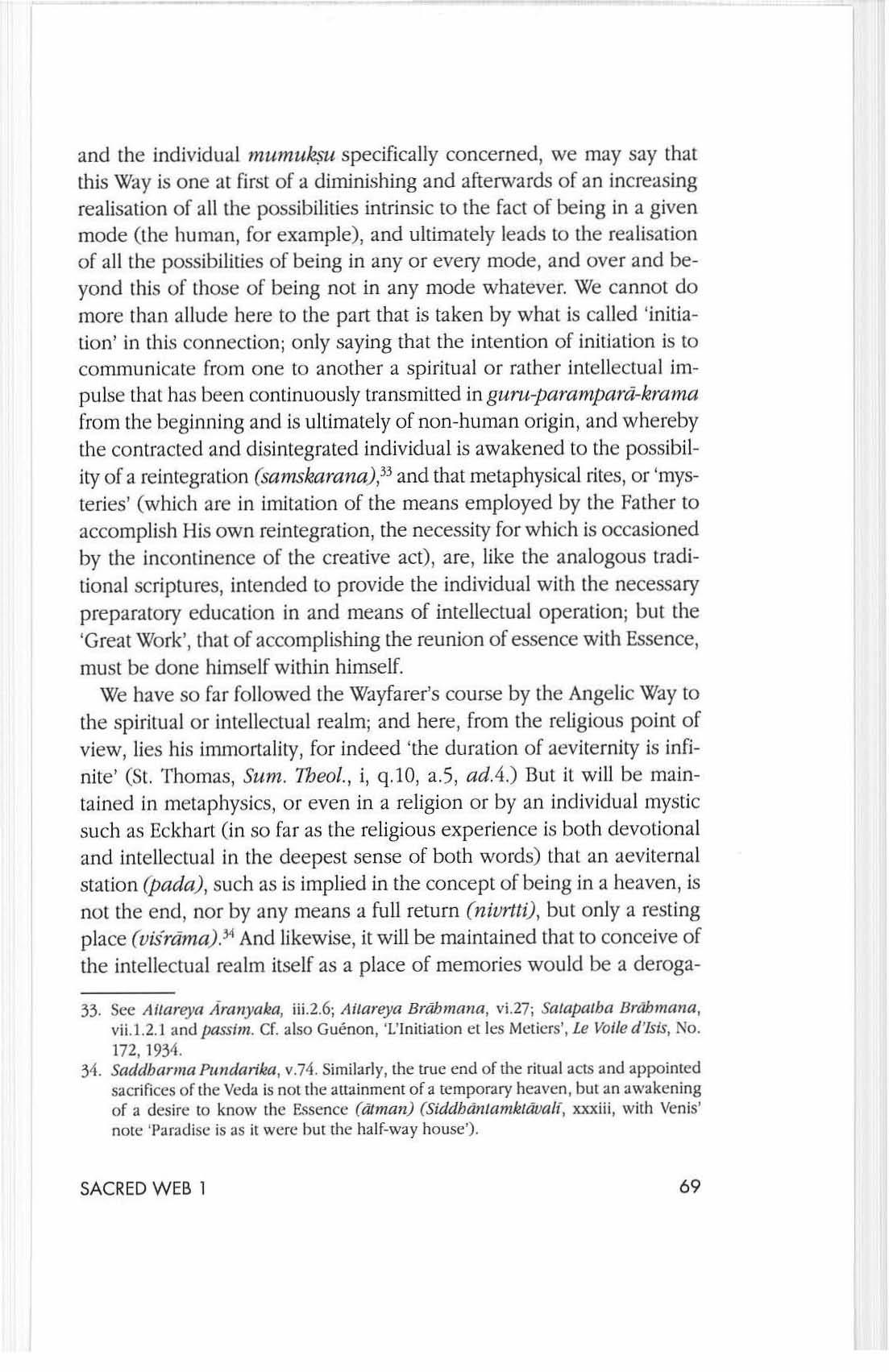
The metaphys ic al concept of Perfection, inde ed, envisages a s tate of being that is, not inhuman since it is maintained that s uch a state is always and everywhere accessible to whoeve r will press inwards to the centra l point of consciousness and being on any ground or p lane of being , nor ' heartless ' unless we mean by ' heart ' the seat of sou lfuln ess and sentimenta lit y; but assu redly non-human. For examp le , in Chdndogya Up . v .lO .2 it is precise ly as amiinava punlSa, ' n on- human person', that the Son and aevit erna l avatdra, Agni,36 is sa id to lead onward the Comprehe nding one who h as found his way through the Supernal Sun to the farther side of the worlds, and this is the ' pathway of the Angels ' (devayiina) as contras ted with that o f the Patriarchs (pilryiina) w hi ch does not lead beyond the Sun but to re-embodiment in a human mode of being. And it is forese e n that this devaydna must lead , w hethe r sooner or later, to what is expressed in doctrinal mysticism as a 'final death of the soul', or 'drowni ng ', th e Sufi al:fanii' an al:fanii; by wh ich is implied a passage beyond eve n conscious ness in deity as act, to a Supreme (Skl. para , pariitpara) beyond a ll trace of even an exemp lary multiplicity, nor in any way ' intelligib le'. And there , so far that is from any possib le ' re miniscence ' of any that ha ve been known or loved in otherness, in the wo rd s of Eckhart , 'No one will ask me whence I came
35. Similarly in Dante, ParadiSO, xxix , 79-81, 'there sight is never intercepted by any new perception, and so there is no need of m e mory, for thought has not been cleft. ' or w hith e r I we nt ', or in RDrni 's, 'No ne h as knowledge of eac h who enters that he is so-and-so o r so-and-so. '37
36. Agni(-PrJjapati), who in the Vedas is th e llerdsman of the Spheres (gopd bbulJ(masya), Waywise Leader (vldvall pa/bab purac/a), Messenger and I-Jerald (di Na, aralt) , and stands as the Pillar of Life at the Parting of the Ways (dyor ba skambba pa/bam vlsa r ge, Rg Veda, x.5.6) in cosmic cruc ifi xion slhllah, Ihld.) , corresponding to the 'dogmati c' Buddha , Chri st as d ist inguished from Jesus, and to the ' Id ea of Muhammad '.
37. Nicholson, Shams-I-Tahriz,p.61.
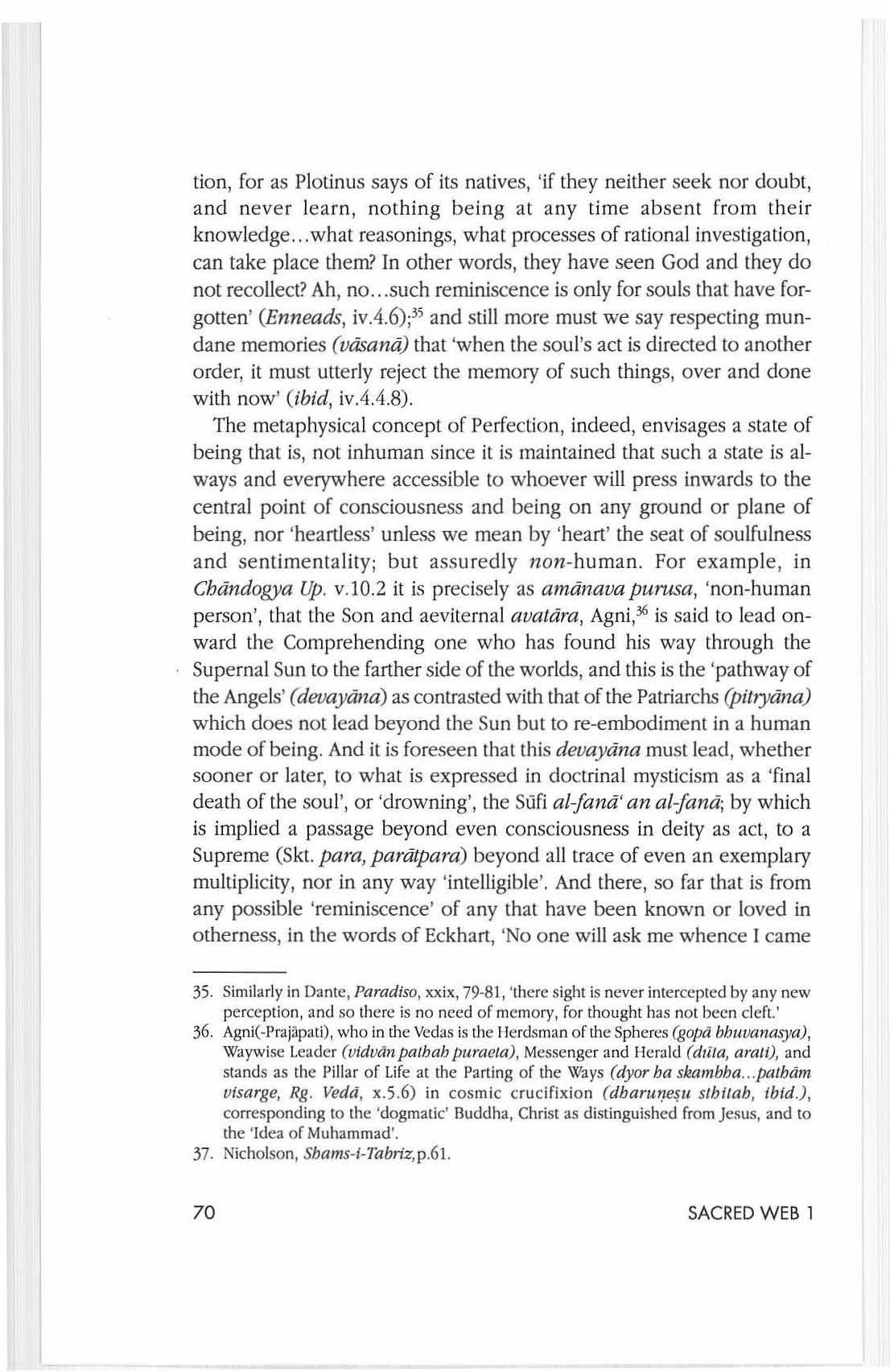
If thi s appears to be a denial of ultimate significance to human love, the position has been altogether misunderstood. For a ll metaphysical formulations , assumi ng t h at an infallible analogy relates every plane of being to every o th er, have seen in human love an image of divine fe licil y (ptunananda), imagined not as a contradiction of but as transformation (pardv/ttl) of sensua l ex peri ence. This is th e the ory o f 'Platonic love ' , according to which, as Ibn Fa rid exp re sses it , 'the charm of every rair youth or love ly g irl is len t to th em from Her Beauty'; a p oin t o f view implicitluo in Erigena 's conception of th e world as a th eop hany, and in th e Scholastic d oc trin e of th e ves tigium pedis , the tr ace o r footp rint of divinity in time, w h ic h ha s its equ ivalent in Vedic and Zen symboli sms. What this means in ac tu a l traditi on is that the beloved o n earth is to be rea lised there not as she is in herself but as she is in God,3tI so it is in the case of Dante and Beatrice, Ibn 'Arabi and an -N izam,j? a nd in that of Ch a ndjd iis and Ramj. " The beauty of th e Beloved there is no longer as it is here contingent and merely a participation or reflection , but that of the Superna l Wisdom , that of th e One Madonna, th at of the in tr ins ic being of th e Bride, w h ich ' rains down flames of fire' (Collviuio) and as ciarilasilluminates and gu id es the pure intellect. In that last and hidden station (guhyam padam), nature and essence, Apsaras and Gandharva, are one and indivisible, knowing nothing of a wi thin or a witho u t (na bdhyam kimcana veda nantaram, Brhadriraflyaka, Up., iv.321), and that is their s upr e m e felicity, and that of every libe rated consciousness.
All this ca n on ly be d escribe d in terms of negation, in terms of what it is n o t , a nd therefore we say again that metaphysics ca n in no way be thought of as a doctrine o ffering consolations to a su ffer in g humanity. What me tap h ysics understands by immortality and by e ternity implies and demands of every man a total and uncompromising denial of himself and a fi na l mortification , to be dead and buried in the Godhead.
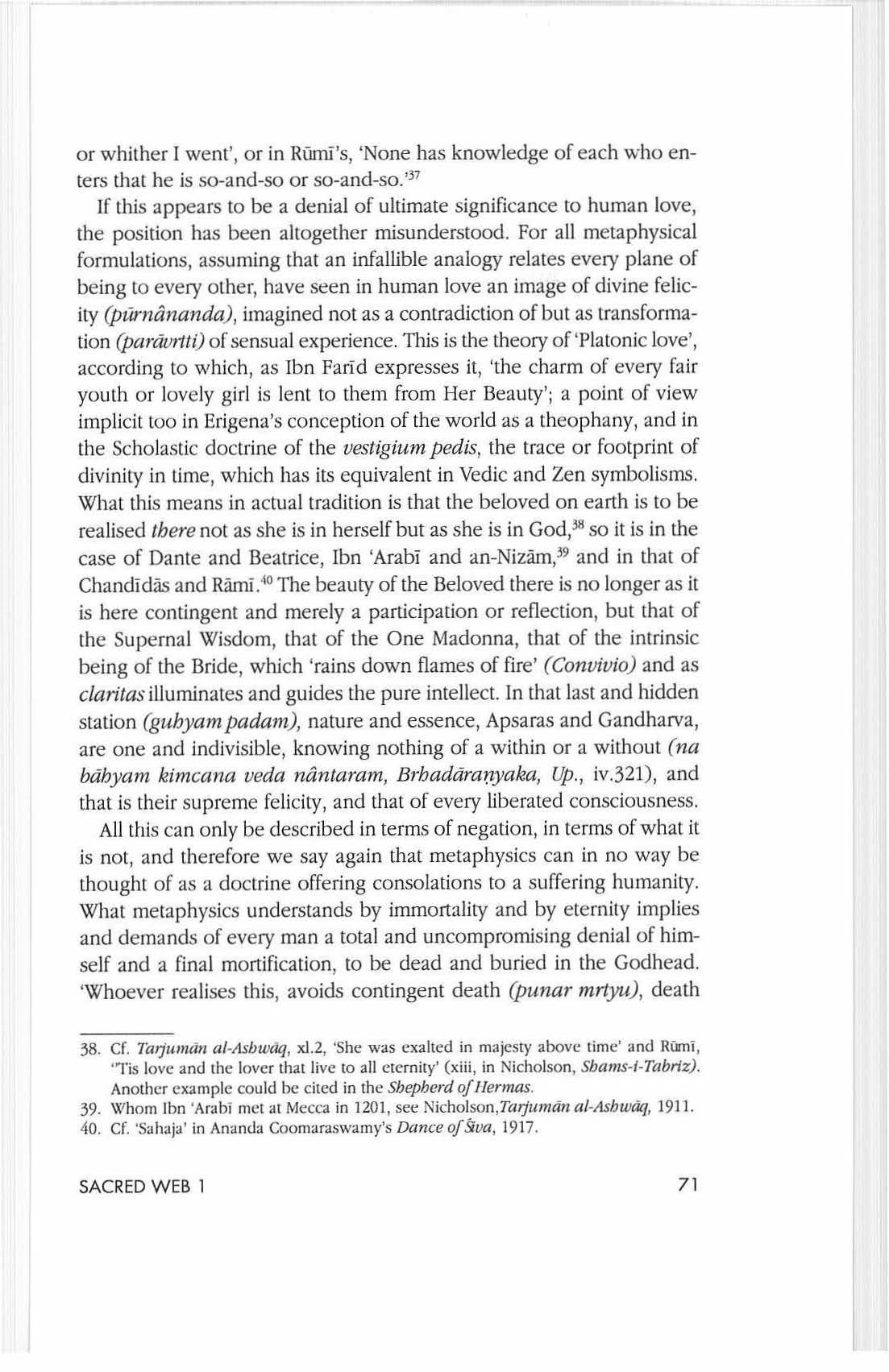
'W hoever rea li ses this, avoids cont ingent dea th (punar mrtyuJ, death
38 cr. Tarjumdll af*lI sbwclq, x1.2 , 'She was exalted in majesty above time' and ROm i , "Tis love and the lover th at live to all e ternity ' (xiii, in Nic ho lso n , Sbams-I-Tabriz).
Another examp le could be cited in the Shepherd of llermas.
39. Whom Ibn ' Arabi met at Mecca in 1201 , sec Nicholson ,Tarjllmiin ai-Ashwdq, 191 1
40. cr. 'S ahaja ' in Ananda Coom araswamy 's Dance of !iva, 1917 SACRED WEB 1 gets him no t, for Death becom es his esse n ce, and of all these Angels he becomes the One' (Brbaddra);zyaka Up., i.2 .7). For the Supreme Identity is no less a Death and a Darkness than a Life and a Light , no less Asura than Deva: 'H is overs hadowing is both Aeviternity and Death' (yasya chtiyd amrla, yasya mrlyub, Rg. Veda, x.121.2)'1 And this is w hat we understand to be the final purpo rt of th e First Philosoph y.
41. Similarly, Salapalha Brdhmana, xA.3.1 - 3 Esa Imi mrlyur yat samvalsarah prajdpalih, 'He , the Father, who is the Year and likewise Death'. '111e Darkness and Lighl, belonging to !-lis astlratva and devalva respectively, remain in Ilim , who is both asura and deva, Titan and angel, smpa and ddilyo; at the same time thai from the Wayfarer's point of view their rene clions in lime and space are evil and good. In Hinduism, 'the Darkness in Him is called I{udra ' (Mailri Up. vi.2), and is represented in lhe names and hues of Kali and Krishna; in Ch ri stian yoga, the Dark Ray or Divine Darkness , Eckhart 's 'sable s t illness ' and 'motionless dark that no one knows but He in whom it reigns ' (cf. the 'Clouds and thick darkness ' of DeuL4: II ) , is spoken of already in the Codex Bracianus and by Dionysius , an d becomes the sub jec t of the cOIliemplatio {n caligille. Regarding the propriety of the expression 'Christ ian yoga ' , we need only point out that S1. Bern:lrd's conslderalio, contemplalfo, and excesStls or raptus corresponds exactly to dhiiralla, dbyalla and samddhf.









